Business
 In today's world of rapid change, strong records and business skills are essential for sound decision making and agile maneuvering. There are many helpful resources available. Please contact us for clarification or any additional information that you may be seeking.
In today's world of rapid change, strong records and business skills are essential for sound decision making and agile maneuvering. There are many helpful resources available. Please contact us for clarification or any additional information that you may be seeking. Relevant Events
Boots in the Barn: Cornell Dairy Research Updates
January 13, 2026
January 20, 2026
January 27, 2026
February 3, 2026
February 10, 2026
February 17, 2026
February 24, 2026
Advanced Hoof Health Program
January 15, 2026
Belfast, NY
Cornell Organic Field Crops & Dairy Conference
March 6, 2026
Waterloo, NY
Crops, Cows & Critters - Southwest New York Dairy, Livestock & Field Crops Newsletter Sponsorship
December 18, 2026
Looking Past the Bin Door
Katelyn Miller, Field Crops and Forage Specialist
Southwest New York Dairy, Livestock and Field Crops Program
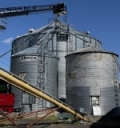
As grain enters the bins, I've been having more frequent conversations about commodity marketing. There is no one size fits all approach, but one thing remains the same: understanding your cost of production is the foundation of every sound management decision.
Governor Hochul Announces Two Grant Opportunities
Governor Hochul has announced two grant opportunities to help address the impacts of climate change and protect water quality. Funding is available in four tracks: Livestock Management (alternative waste and precision feeding management), Adaptation and Resiliency, Healthy Soils, and Agricultural Forestry Management. Contact your local Soil & Water Conservation office for more information.
Grants & Incentives for New York Agriculture
By Farm Credit East
There are a number of grants and incentives available for Northeast agriculture businesses, but learning about their availability and navigating the application process can be a challenge. To help with this, Farm Credit East has released an update to its report identifying federal, regional and state grants, loan guarantees, and other incentives available to assist Northeast producers of all types and sizes.
This post is an excerpt from the document, focusing on funding opportunities available in New York. Find a full list of opportunities, including sector-specific opportunities for states including, but not limited to New York, see here.
Budgeting and proposing operational changes to or with senior management
By Jason Karszes
On more and more dairy farms every year, employees play integral roles in day-to-day operations, decision making, and problem solving. In these roles, ideas for changes to operations and for capital investments are generated. While these ideas might be quite important to the middle manager for their area, across the farm other opportunities in support of the overall priorities and mission of the farm also need to be considered.
Proposing change to the leadership of the farm, or as part of the leadership team, is typically an essential step to improve farm operations. Developing proposals in support of the change can help with identifying all the potential risks and returns and decision-making by the senior management team. Several key areas to address in the proposal are laid out below.
Sharing PRO-DAIRY's Dairy Market Watch resource
Kate McDonald Polakiewicz, Farm Business Management
Southwest New York Dairy, Livestock and Field Crops Program
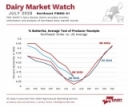
In case you aren't aware of this resource, PRO-DAIRY's Dairy Market Watch provides monthly information and analysis of Northeast dairy market trends. Just released are the July 2025 data.
Welcoming Kate, our Farm Business Management Specialist
Kate McDonald Polakiewicz, Farm Business Management
Southwest New York Dairy, Livestock and Field Crops Program

Kate McDonald Polakiewicz has joined our team as Farm Business Management Specialist and will be offering programming in financial management, production economics, business planning, and market analysis.
Pricing Corn Silage - Preliminary Fall 2025 Estimates

You might think it's too early to talk about corn silage harvest, but this season's challenges have many re-evaluating plans. Preliminary estimates from John Hanchar, NWNYDLFC, put the corn silage price at approximately $63 per ton. These early estimates can support informed decision-making as cropping and forage strategies shift.
Pesticide Label Changes Brought on by the Endangered Species Act
Katelyn Miller, Field Crops and Forage Specialist
Southwest New York Dairy, Livestock and Field Crops Program

Changes to our pesticide labels are coming including mitigation strategies for spray drift and runoff/erosion. Check out this article to see how these updates will appear on our product labels.
Ag Safety and Health Springtime Preparations

Spring is one of the busiest times of the year on a farm. Even if things are busy, keep health and safety to the forefront of what you do.
Worried About Being Classified as a Hobby Farm by the IRS? What you Need to Know

Tax season is over, but you may be wondering if you may be audited by the IRS or incorrectly classified as a hobby farm. This article investigates the classification of farms as businesses vs hobbies, what the IRS is looking for in a business, and what records you need to keep to prove you're a legitimate business.
Egg Prices are Historically High - Time to Re-Evaluate your Costs of Production
Amy Barkley, Team Leader & Livestock Specialist
Southwest New York Dairy, Livestock and Field Crops Program

It takes a whole lot to produce a dozen eggs! Now's a great time to evaluate your costs so that you can charge a fair price that still enables you to make a profit.
USDA Expediting Direct Economic Assistance to Agricultural Producers

U.S. Secretary of Agriculture Brooke Rollins announced that the U.S. Department of Agriculture (USDA) is issuing up to $10 billion directly to agricultural producers through the Emergency Commodity Assistance Program (ECAP) for the 2024 crop year. Eligible producers must report 2024 crop year planted and prevented planted acres to FSA on an FSA-578, Report of Acreage form. Contact your local FSA office for more information.
Negotiating Land Leases & Building Strong Relationships for Long-Term Success
Katelyn Walley, Business Management Specialist and Team Leader
Southwest New York Dairy, Livestock and Field Crops Program
Leasing farmland can be a great opportunity for both farmers and landowners, but it takes good communication and a fair agreement to make it work. In small towns and rural communities, word gets around fast--so it's important to start off on the right foot and keep things positive. Here are some key steps to help you negotiate a land lease that benefits everyone.
Demystifying Ag Value Assessments: A Summary for Landowners and Farmer Renters
Katelyn Walley, Business Management Specialist and Team Leader
Southwest New York Dairy, Livestock and Field Crops Program
Farming comes with plenty of challenges, and property taxes is a pretty big one of them. In New York, the Agricultural Assessment Program helps lower property taxes for land used for farming. Every year, if you own or rent farmland, this program can save you money. Here's what you need to know to take advantage of this benefit AND connect with rented landowners to ensure they're receiving this benefit.
Reflections From The 2025 Operations Managers Conference
Katie Callero, Dairy Management Specialist
Southwest New York Dairy, Livestock and Field Crops Program

The 2025 Operations Managers conference entitled "Empowering Managers: Embracing Diversity, Consistency, and Attitude for Success" was hosted by Cornell PRO-DAIRY and Northeast Dairy Producers Association at the end of January. Check out some of my favorite takeaways from the conference.
Setting Your Farm Financial Resolutions Series Information
Katelyn Walley, Business Management Specialist and Team Leader
Southwest New York Dairy, Livestock and Field Crops Program
Selling Turkeys This Year? Reminders for Labeling and Handling
Amy Barkley, Team Leader & Livestock Specialist
Southwest New York Dairy, Livestock and Field Crops Program

As you're planning your turkey harvest and sales, keep safe handling, proper labeling, and regulations on sale in mind to enjoy a stress-free and food safety-forward holiday season.
Dairy Delights and Good Advice by Margaret Quaassdorff
Nestled atop a hill overlooking Seneca Lake, sits Shtayburne Farm Creamery, a quaint value-added dairy farm business run by the Hostetler Family. I spent an afternoon with brothers, Lorin and Lance and their family, who I found not only to be serving up ice cream flights and farmstead cheese, but good advice for those farmers interested in value-added dairy processing.
Value Added Dairy Tour - That's a Wrap!
On March 13th and 14th, a group of 23 farmers and small dairy processors from Western NY traveled with the CCE NWNY and SWNY Teams to successful farms and businesses who work within the value-added dairy processing space on the eastern side of the state. This trip was a result of a growing interest for locally produced specialty dairy products, and a desire from farmers to learn about options to diversify their dairy farm businesses.
State Opens up $4.25M in Grant Funding for Beginning and Disadvantaged Farmers
Amy Barkley, Team Leader & Livestock Specialist
Southwest New York Dairy, Livestock and Field Crops Program

Two competitive state grants are available to fund start-up, improvement, or expansion of farm operations; support for marketing, training, construction, and more! Applications open October 25th and December 30th, closing January 24th, 2025 and December 30, 2024, respectively.
It's Time - End of the Year Tax Planning (Part One)
Katelyn Walley, Business Management Specialist and Team Leader
Southwest New York Dairy, Livestock and Field Crops Program

The sun is still shining, crops are still growing, and your mind is probably the farthest it possibly can be from tax planning. But - Fall is a great time to focus on tax planning and managing your tax liabilities. By creating a tax strategy BEFORE January 1st, you'll avoid those (always fun) December 31st equipment purchases and (less fun) stress and headaches.
Want to learn more about Value Added Dairy Production? Start here!
Katelyn Walley, Business Management Specialist and Team Leader
Southwest New York Dairy, Livestock and Field Crops Program
Are you a dairy producer interested in on-farm dairy processing? Looking to diversify your operation with direct to consumer sales? Interested in value-added production? Tired of scouring the internet to find a whole lot of information that you're not sure actually applies? Here's a great place to start!!!
Weekly USDA Farmer's Market Price Reporting is Starting to Come in!

This weekly price reporting information shows the range and average prices that farmers across the state receive for vegetables, fruit, meats, and dairy products using Square Point of Sale software. This article shares more about the project as well as opportunities to get involved and contribute to the price reporting.
Preparing for Hot Weather by Steve Hadcock
As I write this article (5/20/2024), we are experiencing some unusually warm weather. While I hope that some cooler and more seasonable days will return, we can expect many hot, humid days this summer. Now is a good time to start thinking about how you will protect yourself, your family members, and your employees from heat-related illnesses.
MeatSuite is a Free Online Database for Farmers to Advertise Bulk Meats
Amy Barkley, Team Leader & Livestock Specialist
Southwest New York Dairy, Livestock and Field Crops Program

This online database of farms received over 8,300 visits from NYS customers in 2023 and is anticipated to gain momentum into 2024. You can join for free at any time. If you're already a member, this is a friendly reminder to make updates to your page.
What the Ag Census Has to Say About Farm Labor
Katelyn Walley, Business Management Specialist and Team Leader
Southwest New York Dairy, Livestock and Field Crops Program
The Ag Census counts Hired Farm Labor and collects data on the number of farms with hired labor, the total number of hired farm workers, and the total payroll paid for hired labor. Separately, the number of farms with migrant or contract labor and the total number of migrant workers is also collected. Farms can have both migrant and hired labor, and migrant labor is not included in the total payroll paid nor number of hired farm workers. Many farms also rely on unpaid farm labor that is typically performed by family members, and the ag census collects that data as well (although, it's not included here).
Northeast Goat and Sheep Dairy Development Grant is Now Accepting Applications!
Amy Barkley, Team Leader & Livestock Specialist
Southwest New York Dairy, Livestock and Field Crops Program

The Northeast Dairy Business Innovation Center is now accepting applications for their Goat and Sheep Dairy Development Grants, which can be used for both individual business projects and sector enhancement projects. The deadline to apply is June 6.
Livestock Checkoff Programs 101
Amy Barkley, Team Leader & Livestock Specialist
Southwest New York Dairy, Livestock and Field Crops Program

You may have heard of checkoff programs, but aren't sure exactly what they are, or what they mean to you as a livestock producer. This article sheds some light on the basics.
Reporting Winter Storm Damage - It's Important!
Katelyn Walley, Business Management Specialist and Team Leader
Southwest New York Dairy, Livestock and Field Crops Program

Winter's here, and with that comes high winds, heavy snow loads, power outages, and damages that negatively impact your farm business. Katelyn Walley shares the importance of documenting damages and reporting them here, along with key contact information.
2022 National Beef Quality Audit Results
Amy Barkley, Team Leader & Livestock Specialist
Southwest New York Dairy, Livestock and Field Crops Program
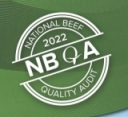
Every 5 years, this audit is used to identify trends in the beef market and in beef cattle in general. It also helps the industry gain an understanding of how the implementation of the Beef Quality Assurance Program has helped reduce losses and improve quality.
Please help us add contacts to our SWNY Farm Service Provider Directory!
Amy Barkley, Team Leader & Livestock Specialist
Southwest New York Dairy, Livestock and Field Crops Program

We want to know which categories and contacts would be most helpful to you! Please take 2 minutes to answer our anonymous survey at https://tinyurl.com/SWNYServiceProviders.
When Milk Prices Are Lousy - Should You Dream Big?
Katelyn Walley, Business Management Specialist and Team Leader
Southwest New York Dairy, Livestock and Field Crops Program
Milk price fluctuations dramatically affect dairy farm business planning, and diversification could be a solution. Here, Katelyn Walley-Stoll outlines five diversification options, including value-added dairy, alternative livestock, alternative crops, agritourism, and renewable energy. The importance of risk assessment and financial planning in pursuing these opportunities is emphasized.
Custom CAFO Manure Applicators Required to Register with DEC
Affected custom applicators have until January 18th, 2024 to register with DEC on their website and then submit annual report activities. Learn more from CALS PRO-DAIRY here.
Regulations for Processing Poultry for Sale
Amy Barkley, Team Leader & Livestock Specialist
Southwest New York Dairy, Livestock and Field Crops Program

Processing regulations surrounding poultry for sale can be confusing. There's much to know regarding what birds you can process, where you can process them, and who you can sell them to. This article outlines the two available options for getting poultry processed in NYS.
RFID Tags - The What, Why, and How
Amy Barkley, Team Leader & Livestock Specialist
Southwest New York Dairy, Livestock and Field Crops Program

RFID tags are one of the USDA-approved official identification tags for cattle, deer, and swine. This article shares some information on what these tags are, how they work, and how you can order them for free for your herd.
FarmOps: Setting Your Farm Financial Resolutions Resources
Katelyn Walley, Business Management Specialist and Team Leader
Southwest New York Dairy, Livestock and Field Crops Program
While not as fun as caring for baby animals, playing in the dirt, and growing food - record keeping is an important tool for farm success. Start the new year off right by setting your farm financial resolutions. In this two part seminar, you'll learn how to set up a record keeping system, identify your financial goals, and be ready to hit the ground running in 2023. Register to receive a fillable record keeping plan and a quarterly farm financial check list.
Some Farm Business Management Reminders by Katelyn Walley-Stoll
Katelyn Walley, Business Management Specialist and Team Leader
Southwest New York Dairy, Livestock and Field Crops Program
Some reminders about the ST-125, NYS Ag Value Assessment, Separate Checking Accounts, Revisiting Your Farm Business Plan, Updating Your Balance Sheet, and Supporting Your County's Cooperative Extension Association.
8 Things to Think About - Farm Diversification and Enterprise Analysis
Katelyn Walley, Business Management Specialist and Team Leader
Southwest New York Dairy, Livestock and Field Crops Program
When conversations about farm diversification come up, I always bring it back to our shared experiences…as dreamers, as doers, as innovators, as people who say "Well, that could have gone better". Specifically, to take this hot topic and break it down, here are my 8 considerations that (I think) are universal in conversations about farm diversification.
Win a Grain Rescue Tube and Training for Your Local Fire Department!

When someone becomes helplessly engulfed in grain, rural firefighters are often the first and only line of defense. Unfortunately, many departments lack the specialized techniques and equipment necessary for a successful grain bin rescue. Nationwide Insurance once again is teaming up with the National Education Center for Agricultural Safety (NECAS), Peosta, Iowa, to award emergency first responders with grain rescue tubes and hands-on rescue training to help save lives.
The contest begins on January 1, 2023 at 8:00 a.m. CT and extends through April 30, 2023 at 11:59 p.m. CT. Only entries submitted during this time will be considered for the contest. To enter, describe how your local fire department or emergency rescue team and community would benefit from grain entrapment training and a rescue tube, as well as how the tube and training could be shared with nearby departments. For more information click here or contact jim.carrabba@bassett.org or call (800)343-7527 ext. 2216.
3 New Year's Resolutions for Farm Financial Management
Katelyn Walley, Business Management Specialist and Team Leader
Southwest New York Dairy, Livestock and Field Crops Program

The beginning of the new year offers us a chance to reset, start with a blank slate, and have the best of intentions for the months ahead. While many of us might make New Year's Resolutions around our health, farm production, and others - I can bet that you've never set some for your farm's financial management!
SWNY Agribusiness Directories
Katelyn Walley, Business Management Specialist and Team Leader
Southwest New York Dairy, Livestock and Field Crops Program
Find contact information for service providers in SWNY including Veterinarians, Feed Mills, Lime/Fertilizer Suppliers, Sheep Shearers, Meat Processing Facilities, and Tax Preparers.
December 2022 Storm Damage Survey

CCE is working with officials to understand the extent of the December 2022 Blizzard. We are collecting information on damage to agricultural infrastructure, equipment, livestock, stored crops, and/or winter produce. You can either fill out the reporting survey, found at https://cornell.ca1.qualtrics.com/.../SV_9AytO5D9oYvRCXc or report the damage to one of our team's regional specialists. If you had damage from the November 2022 storm and haven't yet reported it, you can do that at this time.
A Real Life Reminder for Farm Safety Around Animals!
Katelyn Walley, Business Management Specialist and Team Leader
Southwest New York Dairy, Livestock and Field Crops Program
When working with any type of livestock or equipment, it's key to consider safety to keep yourself, your farm family, employees, and animals safe. On average from year to year, one in every four farm accidents involve animals. Below are some farm safety reminders for working with animals on the farm.
Snow Loads on Barn Roofs from Cornell CALS PRO-DAIRY
Removal of significant snow accumulations off of a barn roof is best performed in a systematic way to reduce the risk of injury or death to both barn occupants and those working on the roof. Removing roof snow without a proper approach may cause more damage than if left alone in some cases by creating an unbalanced and/or concentrated roof loads.
Cornell Meat Suite Relaunch - Is Your Profile Up to Date?

Cornell's MeatSuite.com has been upgraded with new features that make the program easier to use for both farmers and the public. Farmers are requested to update their profiles if they have one. If you're new to the program, you can create a free profile on www.meatsuite.com to share a little about your farm and to list the bulk order meats you have for sale.
Farm to School Program Looking for Farms to Supply Local Foods to Schools

CCE Harvest New York's Regional Farm-to-School Coordinator Program is looking for farms and food businesses to supply local foods to schools in our region, including meats and dairy products.
Fall 2022 Update on the Bird Flu
Amy Barkley, Team Leader & Livestock Specialist
Southwest New York Dairy, Livestock and Field Crops Program

Highly Pathogenic Avian Influenza (HPAI) is still a present threat to NYS commercial and backyard poultry producers as cases across the Northeast increase. New York has seen numerous wild bird positives across the state in the past month, with surrounding states having positive cases in commercial and backyard flocks.
August 2022 Update on Highly Pathogenic Avian Influenza
Amy Barkley, Team Leader & Livestock Specialist
Southwest New York Dairy, Livestock and Field Crops Program

There has been no major update since the last outbreak in a backyard poultry flock on April 6th. However, there are cases still circulating in Western US, with some in the Midwest and along the East Coast. Wild birds in NYS and surrounding states are still testing positive for the virus.
Some Reminders from Your Friendly, Neighborhood, Extension Agent!
Katelyn Walley, Business Management Specialist and Team Leader
Southwest New York Dairy, Livestock and Field Crops Program
Renting Land, Income Tax Planning, NYS Farm Directory, DAP Funding, Monkeypox, Supporting your local CCE Association, and Organic Certification grants.
Dairy Training Resources
Kaitlyn Lutz, VMD, Bilingual Dairy Management Specialist
Northwest New York Dairy, Livestock & Field Crops
This document will guide you to many of the resources available for training dairy farm employees. Topics include:
- Safety
- Animal Handling
- Calf Care
- Milk Quality
- Calving Assistance
- Reproduction
- Herd Health
- Lameness/Hoof Trimming
- Forages/Feeding
- Creating Human Resource Management Documents
- Employee Housing
- Learning Spanish/English
Inflation's Effect on Consumer Purchases and Dairy Farm Expansions
Katelyn Walley, Business Management Specialist and Team Leader
Southwest New York Dairy, Livestock and Field Crops Program
June's Milk Production was up by just 0.3% from 2021.New York saw a decrease of 7,000 head from 2021 to 2022 and a just a 1% increase in milk production per cow. Typically, we see a chain reaction when milk prices are high. Prices go up —> farms add cows —> milk production goes up —> prices go down. However, as we're seeing currently, year over year milk production increases of less than 1-2% can indicate strong or rising milk prices.
Resource for Farmers Selling Meat Breaks Down Yields and Cuts by Species

This resource, compiled by Betsy Hodge of CCE St. Lawrence, outlines the amount of meat that customers can expect from each of the major livestock species by both live and hanging weights. It also breaks down the approximate pounds of different cuts that a consumer can expect to get back from a half or whole animal.
Spotted Lanternfly has Been Found in SWNY- Report Them to Help Slow the Outbreak
Amy Barkley, Team Leader & Livestock Specialist
Southwest New York Dairy, Livestock and Field Crops Program

Spotted Lanternfly, an invasive pest that has a huge appetite for grape vines, fruit trees, maple trees, and other plants, has been sighted in SWNY. Help us delay the spread of this invasive pest by photographing them, killing any that you see, and reporting them to your local CCE office.
More to Hay Moisture than Fire Risk

Heat damage and spontaneous combustion risks should always be at the forefront of hay moisture considerations, however, over drying can diminish forage quality. Focusing on baling at optimal moisture levels might be one way forage producers can improve their forage quality.
Live Bans for Fowl Shows, Swaps, Meets, Auctions, and Sales Have Been Lifted
Amy Barkley, Team Leader & Livestock Specialist
Southwest New York Dairy, Livestock and Field Crops Program

Officials have made the decision to lift the bans on fowl shows, swaps, meets, auctions, and sales. White poultry shows and commerce are getting back to normal, we still need to take precautions to keep our birds safe from Avian Flu.
7 Business Planning Considerations for On-Farm Dairy Processing
Katelyn Walley, Business Management Specialist and Team Leader
Southwest New York Dairy, Livestock and Field Crops Program

With the current volatile dairy market, rising input costs, and continued challenges in commercial dairy production, dairy farm owners are looking for new ways to improve their profitability. If you're a dairy farmer interested in diversifying or vertically integrating your business, one option could be on-farm processing of raw milk into value-added goods and bottled fluid milk for sale. While this might seem like a fun, lucrative, and sustainable new venture at first glance, it's important to consider how you'll need to adjust and address your farm's business plan to accommodate for this change.
New York State Farm Directory launching in June 2022

From our friends at Cornell CALS
As part of Cornell Cooperative Extension's role in strengthening New York State agriculture, we are helping to spread word of the New York State Department of Agriculture and Markets' plans to launch a statewide online Farm Directory.
So, What Adds Value to a Beef Calf?
Amy Barkley, Team Leader & Livestock Specialist
Southwest New York Dairy, Livestock and Field Crops Program

Pre-conditioning through castration, vaccinations, weaning, and deworming can all add value to a calf, while providing a robust animal to buyers for their finishing stages of production.
Seeking Participants for Pastured Broiler Cost of Production Study
Amy Barkley, Team Leader & Livestock Specialist
Southwest New York Dairy, Livestock and Field Crops Program

The SWNY Dairy, Livestock, and Field Crops Program is currently seeking participant farmers in Allegany, Cattaraugus, Chautauqua, Erie, and Steuben counties to take part in a study that will evaluate the true costs of production in pastured broiler enterprises. Farmers will be compensated for their time on the project. If you're interested in learning more, reach out to Amy Barkley at amb544@cornell.edu or 716-640-0844.
2022 Goat Industry Update

This article written by Ken McMillin and Frank Pinkerton gives insight into goat production trends in the United States for this year and years previous. While broad in scope, it will help readers understand goat markets from a whole system prospective.
Navigating, Valuing, and Negotiating Land Leases
Katelyn Walley, Business Management Specialist and Team Leader
Southwest New York Dairy, Livestock and Field Crops Program

4.21.22 Navigating, Valuing, and Negotiating Land Leases Materials
Katelyn Walley, Business Management Specialist and Team Leader
Southwest New York Dairy, Livestock and Field Crops Program
Let's Talk About Making a Profit
Katelyn Walley, Business Management Specialist and Team Leader
Southwest New York Dairy, Livestock and Field Crops Program
Profit. It seems that the term "profit" stirs different types of emotion into farmers' hearts whenever I try to casually bring it up in kitchen table conversations. For some, profit has always been a goal - will always be a goal - and is tracked from year-to-year, or even month-to-month. For others, profit is a lofty idea that, in theory, the farm strives for - as long as they don't have to pay in any income taxes at the end of the year. Yet, for some, profit is a "bad word" and definitely not the right reason to be in the business of farming.
6 Reasons Why You Might Want to Drag Your Feet to the Carbon Credit Market
Katelyn Walley, Business Management Specialist and Team Leader
Southwest New York Dairy, Livestock and Field Crops Program

For some, selling carbon credits can be a helpful and efficient way to boost/diversify farm income. Especially since most of the practices that are used to sequester carbon also provide added soil health and additional benefits to the farmstead. Now, here are some key considerations and questions that you should consider before jumping right in.
USDA AMS Meat and Poultry Inspection Readiness Grant Now Accepting Applications

The Meat and Poultry Inspection Readiness Grant (MPIRG) program assists currently operational meat and poultry slaughter and processing facilities in obtaining a Federal Grant of Inspection under the Federal Meat Inspection Act (FMIA) or the Poultry Products Inspection Act (PPIA); or to operate as a State-inspected facility that is compliant with FMIA or PPIA under a respective Cooperative Interstate Shipment (CIS) program. Applications are due May 24, 2022.
USDA's Meat and Poultry Processing Capacity Technical Assistance Program (MPPTA)

USDA's Meat and Poultry Processing Capacity Technical Assistance Program (MPPTA) can help federal grant applicants complete their applications. There are many experts across multiple organizations that can assist.
Announcement of Fowl Show Ban in NYS - Will Re-Evaluate in Late May

With cases of Highly Pathogenic Avian Influenza increasing in NYS, Commissioner Ball has issued an order to ban all live fowl shows and exhibitions to help stop the spread. The situation will be re-revaluated at the end of May prior to the upcoming fair season.
SUNY Cobleskill Announces Openings for 2022 Beef Processing Class

SUNY Cobleskill announces openings for a comprehensive multi-day workshop that will teach beef producers to maximize their marketing yield, and understand the regulations surrounding beef processing. This in-person course will be held from May 18 - 20, 2022.
SUNY Cobleskill Announces Openings for Meat Processing and Food Safety Class

SUNY Cobleskill is offering intensive, basic training certification in whole carcass utilization, equipment use, and sanitation within federal compliance. The course will be in-person, Monday through Friday from September 12th - October 7th, 2022.
Calculating Your Cost of Production - Start with Knowing Your Numbers!
Katelyn Walley, Business Management Specialist and Team Leader
Southwest New York Dairy, Livestock and Field Crops Program

Cost of Production is a financial analysis tool for farms of all shapes and sizes to use to improve their decision making capacity and operate their farm business profitably. Cost of production is calculated by adding the costs associated with a certain farm enterprise (or production area), and dividing that by the total units of production over a designated time frame (usually a year).
Study Reviewing Point-of-Sale (POS) Software and Marketing at Farmer's Markets

New POS systems present opportunities for farmer's market vendors to improve sales. Cornell researchers are collecting data using POS with NY farms selling meat, fruits, vegetables, fresh cut flowers and mushrooms in direct-to-consumer channels. The project seeks farms that sell their own products at farmers markets, farm stores, and staffed farm stands to participate.
NYCAMH Holding Respirator Fit Testing Clinics in NWNY from April 7th - May 13th
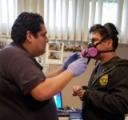
These clinics meet Worker Protection Standard (WPS) requirements for pesticide handlers, including certified private and commercial applicators. They include medical evaluations, respirator fit tests, and WPS - compliant trainings on how to properly inspect, put on, take off, fit, seal, check, use clean, maintain, and store respirators. To schedule an appointment, growers should contact NYCAMH directly at 800-343-7527 or FitTest@bassett.org.
USDA Announces Grant to Expand Meat and Poultry Processing

This grant program provides funds to help eligible processors expand their capacity through building additional facilities, modernizing facilities/equipment, converting to USDA inspection, and other activities. Applications are due by April 11th.
National Young Farmers Coalition announces Young Farmers Grant Program
The National Young Farmers Coalition is partnering with Chipotle to offer $5,000 grants to 50 young farmers and ranchers to support them in building careers in agriculture.
Assess Your Farm Business Health within a Farm Financial Peer Learning Circles
Katelyn Walley, Business Management Specialist and Team Leader
Southwest New York Dairy, Livestock and Field Crops Program
Cornell Small Farms Program (CSFP) and Cornell Cooperative Extension are teaming up with diversified farmers like you to analyze your farm's finances and have productive, honest discussions about the state of your business and opportunities for improving your financial outcomes.
Thinking about a solar lease? Here are 5 things you should consider.
Katelyn Walley, Business Management Specialist and Team Leader
Southwest New York Dairy, Livestock and Field Crops Program

Rural landowners across the Southwest New York Region, and New York State in general, have been receiving invitations from solar companies to lease their land for utility scale solar arrays. While this has been around for several years, the general trend of increasing renewable energy sources has spurred lots of conversations about the potential benefits, pitfalls, and logistics of hosting solar arrays on your property.
Dairy Margin Coverage - Foundational Risk Management for your Milk Production
Katelyn Walley, Business Management Specialist and Team Leader
Southwest New York Dairy, Livestock and Field Crops Program
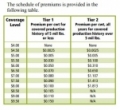
For dairy farmers, milk production and profitability can be a tricky thing to plan for. It's even trickier when you take into consideration all of the different places where systems can break down, prices can drop, and life (or a more visual term synonymous with manure) happens. Knowing your options for farm risk management, especially dairy price risk management, is important to make sound decisions to help protect your farm financially.
Dairy Revenue Protection - What does it even mean?
Katelyn Walley, Business Management Specialist and Team Leader
Southwest New York Dairy, Livestock and Field Crops Program

Nine(ish) terms you need to know. If you're a dairy farmer new to insurance, your head might be spinning every time you hear or read something about Dairy-RP or LGM-Dairy or MPP-Dairy! While the best thing you can do to learn more about Dairy Revenue Protection in general is to call up a certified crop insurance agent, hopefully this "glossary" can help you get started!
It's DMC Time! More information about 2022's Dairy Margin Coverage program.
Katelyn Walley, Business Management Specialist and Team Leader
Southwest New York Dairy, Livestock and Field Crops Program
You can now enroll and change your coverage options for your farm's DMC coverage, December 13, 2021 - February 18, 2022. There have been a few changes to this year's program, summarized below. Visit the Dairy Margin Coverage Program website for more information.
Know Your Numbers Know Your Options - Tuesdays January 25 - February 22
Katelyn Walley, Business Management Specialist and Team Leader
Southwest New York Dairy, Livestock and Field Crops Program
Annie's Project Know Your Numbers and Know your Options (KYNKYO) is a workshop series designed to deliver basic farm financial literacy that will empower farm women to better understand how financial statements assist in making rational decisions. KYNKYO helps farm women effectively communicate with their families, business partners, and lenders.
NYS Covid-19 Pandemic Small Business Recovery Grant Program
Katelyn Walley, Business Management Specialist and Team Leader
Southwest New York Dairy, Livestock and Field Crops Program
The New York State COVID-19 Pandemic Small Business Recovery Grant Program was created to provide flexible grant assistance to currently viable small businesses, micro-businesses and for-profit independent arts and cultural organizations in the State of New York who have experienced economic hardship due to the COVID-19 pandemic.
Spotted Lanternfly is in NYS - Please stay on the lookout for this pest!
Amy Barkley, Team Leader & Livestock Specialist
Southwest New York Dairy, Livestock and Field Crops Program
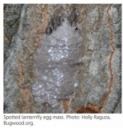
The Spotted Lanternfly is in NYS, and tends to destroy vineyards, hopyards, orchards, and forests. If you see this insect or it's egg masses in winter (which look like smears of concrete), please contact NYS Ag and Markets or your local extension agent.
State Ag Commissioner Encourages Industry to Apply for Grant Program
Grants of Up to $50,000 are Available for Eligible Small Businesses With Revenues of Up to $2.5 Million and Experiencing Financial Hardship Due to COVID-19
What do you want to see for the future of New York State's food system by 2050?
We invite you to participate in a statewide Farmer Survey to prioritize investments for the NYS food and farming system as we look towards building an equitable, resilient, profitable, and healthy future.
USDA Offers Funding to Reimburse Farms Transitioning to Organic Production
Amy Barkley, Team Leader & Livestock Specialist
Southwest New York Dairy, Livestock and Field Crops Program

The U.S. Department of Agriculture (USDA) is providing up to $20 million to reimburse agricultural producers and handlers who are certified organic and crop and livestock producers who are transitioning to organic for eligible expenses incurred during fiscal years 2020, 2021, and/or 2022.
Solar Leases and Farms
Amy Barkley, Team Leader & Livestock Specialist
Southwest New York Dairy, Livestock and Field Crops Program

New York is experiencing a boom in solar development, and many of those developments intersect with farmers and their land. In this article, Caroline Hunt of Yates County shares the takeaways of the recent workshop, "Navigating Solar Lease Agreements and the Solar Development Process: A Program for NY Farmers and Rural Landowners". In it are important points to consider when leasing your farmland for solar.
Do You Have a Good Relationship with Your Farm Accountant?
Katelyn Walley, Business Management Specialist and Team Leader
Southwest New York Dairy, Livestock and Field Crops Program

Farm accountants are critical to any farm business. They do so much more than file your taxes. They can analyze your business, prepare financial statements and help you with compliance issues. They also serve as another point of view when it comes to making changes on the farm.
CCE NYS Pastured Broiler Survey
Amy Barkley, Team Leader & Livestock Specialist
Southwest New York Dairy, Livestock and Field Crops Program

Help us understand budgeting and costs of production of pastured broiler enterprises across NYS! Current and prospective producers are both invited to participate. https://cornell.ca1.qualtrics.com/jfe/form/SV_2atyNUBmyRFOkom
Please Don't Use Ivermectin in People
Katelyn Walley, Business Management Specialist and Team Leader
Southwest New York Dairy, Livestock and Field Crops Program
COVID doesn't seem to be going away, and while there are things we can do to prevent the spread (vaccinations, social distancing, mask wearing, and not licking shopping carts), self-medicating with Ivermectin isn't one of them. The American Association of Bovine Practitioners recently released a safety alert warning folks against using Ivermectin in people which could cause serious health effects and death.
Grant Seekers: SAM & DUNS: Register Your Business Now!
Amy Barkley, Team Leader & Livestock Specialist
Southwest New York Dairy, Livestock and Field Crops Program

SAM & DUNS registrations are free and needed to apply for federal grant opportunities. While it takes minutes to apply, it may take weeks to receive your number. Registering your farm or business now means that you'll be prepared for grant opportunities that may come your way.
New York HERO Act in Effect NOW
Employers are Required to Activate Plans and Prevention Measures. Call Katelyn Walley-Stoll at 716-640-0522 for more information.
Raising Prices on Meat, a Pep Talk
Amy Barkley, Team Leader & Livestock Specialist
Southwest New York Dairy, Livestock and Field Crops Program

A team of Cornell researchers conducted a price comparison study across meats sold from small farms and grocery stores. The results of their findings are included in this article, which also addresses how farmers can challenge their assumptions when considering raising prices for their locally produced meats.
Cornell Cooperative Extension Farmer School Tax Series
Katelyn Walley, Business Management Specialist and Team Leader
Southwest New York Dairy, Livestock and Field Crops Program
Cornell Cooperative Extension's Farmer Tax School: An educational series from Cornell Cooperative Extension Farm Business Management Specialists offering courses designed to inform and empower farm managers to better understand their tax obligations, management strategies, and improve farm profitability. This consists of four courses offered October 2021 - January 2022. For more information, visit tinyurl.com/ccetaxschool.
Dairy Market Watch - July 2021
Katelyn Walley, Business Management Specialist and Team Leader
Southwest New York Dairy, Livestock and Field Crops Program
Dairy Market Watch is an educational newsletter to keep producers informed of changing market factors affecting the dairy industry. Dairy Market Watch is published on the last Tuesday of every month, funded in part by Cornell Pro-Dairy, and is compiled by Katelyn Walley-Stoll, Business Management Specialist with the Southwest New York Dairy, Livestock & Field Crops Program.
USDA Ready to Help NY Farmers Recover from Recent Storms
Amy Barkley, Team Leader & Livestock Specialist
Southwest New York Dairy, Livestock and Field Crops Program

SYRACUSE, New York, July 16, 2021 — Recent extreme weather conditions have impacted farmers and ranchers in New York. The U.S. Department of Agriculture (USDA), through the Farm Service Agency (FSA), has disaster assistance programs available to help agricultural producers recover after natural disasters, including floods.
Management Practices to Add Value to Beef Calves
Amy Barkley, Team Leader & Livestock Specialist
Southwest New York Dairy, Livestock and Field Crops Program

Pre-conditioning calves may take additional effort, but integrating relatively simple practices into a management program can result in higher prices at market and a leg up if those animals are remaining on the farm to be finished. Learn more in this article from Mark Johnson and Paul Beck from Oklahoma State University.
USDA Announces Grant to Assist Small Meat Processors Attain Federal Inspection
Amy Barkley, Team Leader & Livestock Specialist
Southwest New York Dairy, Livestock and Field Crops Program

Small and mid-sized red meat and poultry processors looking to move from 5-A or custom exempt to USDA (federal inspection) status are encouraged to apply for this competitive grant. Applications are due by August 2nd, 2021.
What Are You Culturing?

Tim Terry, Dairy Farm Strategic Planning Specialist with Cornell PRO-DAIRY, shares strategies for identifying and creating a positive environment for your farm, family, and employees.
What can the Dairy Advancement Program do for You?
Katelyn Walley, Business Management Specialist and Team Leader
Southwest New York Dairy, Livestock and Field Crops Program
Dairy producers in New York State, with a preference for small to mid-sized farms, are eligible for funding to address business needs to stay competitive and sustainable in today's agricultural environment! The Dairy Advancement Program provides financial support to NY dairy producers that can be used to engage professionals for financial analysis and to create business plans, design new or remodeled farm facilities, and develop farmstead environmental plans, including design of practices identified in the farm comprehensive nutrient management plan. For more information, contact Katelyn Walley-Stoll in the SWNY region at 716-640-0522 or visit prodairy.cals.cornell.edu/dairy-advancement.
Keeping dairy and processing separate by Gary Sipiorski

As more dairy farmers consider marketing directly to consumers, Hoard's Dairyman has provided some additional insight on setting up a processing enterprise and how that might financially interlink with the dairy farm. Their information is available here, or check out the On-Farm Dairy Processing Webinar the team hosted in 2020.
New Report Summarizes NYS Meat Processor Needs and Perspectives
Amy Barkley, Team Leader & Livestock Specialist
Southwest New York Dairy, Livestock and Field Crops Program

In Fall 2020, CCE interviewed all NYS meat processing facilities to gain an understanding of businesses' interest in expanding or upgrading to a higher level of inspection, barriers to sustainability and growth, and what types of support they needed. Read the full report here.
Queer, BIPOC Farmers are Working for a More Inclusive and Just Farming Culture
Traditionally marginalized communities experience farming culture differently and often in a negative manner. Young, queer farmers of color say they encounter high rates of racism, sexism, and other forms of identity-based oppression in farm country. Here's how they're working to change that.
Property Assessment Grievance Day is Coming, Are You Ready? by NY Farm Bureau
Amy Barkley, Team Leader & Livestock Specialist
Southwest New York Dairy, Livestock and Field Crops Program

Property Assessment Grievance Day occurs once a year, usually on the 4th Tuesday in May (though the date varies by municipality), and provides landowners an opportunity to review and contest their assessments. Assessments can be reviewed on your local municipality's website, and discrepancies can be brought up with your local assessor.
Feeding Small Grains to Beef Cattle, Penn State Extension
Amy Barkley, Team Leader & Livestock Specialist
Southwest New York Dairy, Livestock and Field Crops Program

Small grains can be alternatives to corn in beef rations. These grain sources can be added into crop rotations and distribute cropping and pricing risks, bearing in mind an equivalent or advantageous exchange price without sacrificing feed value.
Recruitment of Shepherds, Beekeepers, and Solar Sites for Industrial Solar Study
Amy Barkley, Team Leader & Livestock Specialist
Southwest New York Dairy, Livestock and Field Crops Program

The American Solar Grazing Association (ASGA) announced on May 4th that it will collect and analyze data on the agricultural, economic, and environmental impacts of co-locating agricultural enterprises such as commercial beekeeping and sheep grazing on photovoltaic sites.
Helpful Coronavirus Vaccination Updates for Farm Managers and Owners
Katelyn Walley, Business Management Specialist and Team Leader
Southwest New York Dairy, Livestock and Field Crops Program
Getting a vaccine and following CDC advice will be the best protection from COVID-19 for you, your family, your community, and your farm employees. While this is a highly personal decision, the more people on your farm that are fully vaccinated the lower your risk of experience a COVID outbreak. As a farm manager, you have the potential to influence employee attitudes about the vaccine. To help you lead these conversations and take steps towards this important prevention measure, we've got several resources available.
Checking Insect Traps in the Snow - What we have so far?
Joshua Putman, Field Crops and Forage Specialist
Southwest New York Dairy, Livestock and Field Crops Program

As of this week, we have our first moth captures in SWNY. Two black cutworm moths were captured in Steuben County and no moths were collected from Cattaraugus County. As temperatures increase and the spring progresses, be on the lookout for these yield robbing pests.
Small Flock Turkey Production, by Penn State Poultry Extension
Amy Barkley, Team Leader & Livestock Specialist
Southwest New York Dairy, Livestock and Field Crops Program

Looking to add a small-scale turkey flock to your farming enterprise? This article provides information and a series of excellent resources to get you started.
Farm Business Foundations - Quick, Useful, and Free!
Katelyn Walley, Business Management Specialist and Team Leader
Southwest New York Dairy, Livestock and Field Crops Program
Farms of all shapes and sizes can benefit from helpful tune-ups. Equipment maintenance, herd health checks, and milk house deep cleaning are all things we do to keep things running smoothly. But - when was the last time you checked in on your Farm Business Management know how? Katelyn Walley-Stoll is going to offer a series of webinars from 7pm - 8pm on Thursdays in May for beginning and transitioning farms, or for those that just need a tune-up.
The Importance of Accurately Measuring Your Planted Acreage this Season!
Katelyn Walley, Business Management Specialist and Team Leader
Southwest New York Dairy, Livestock and Field Crops Program

As you're headed out to plant this season, keep in mind the importance of accurately measuring and recording your planted acreage! Not only is it important to verify your seeding rates and anticipate your nutrient management needs, but this plays a crucial role in crop insurance for your farm.
Webinar Recordings for Beef Producers Now Available
Amy Barkley, Team Leader & Livestock Specialist
Southwest New York Dairy, Livestock and Field Crops Program

Cornell's Livestock Program Work Team has completed it's three-webinar series on the three major beef operations: "Insights to the Cow/Calf Enterprise", "Introduction to Stocker Cattle", and "Beef Finishing Programs". If you missed any of these three webinars, you can watch them for free. You can find more details in this article.
Opportunity: Cornell By-the-Cut Meat Pricing and Sales Research Project
Amy Barkley, Team Leader & Livestock Specialist
Southwest New York Dairy, Livestock and Field Crops Program
Cornell University is researching direct-to-consumer sales of locally-raised meat products sold by-the-cut to help meat producers improve profitability. The project team is looking for farm participants. Participation includes collecting sales data with Point-of-Sale (POS) online sales software, like Square, and using Cornell's new online Meat Price Calculator.
New and Modified CFAP2 Applications Accepted
Katelyn Walley, Business Management Specialist and Team Leader
Southwest New York Dairy, Livestock and Field Crops Program
FSA recently announced that $2.5 million in additional Coronavirus Food Assistance Program (CFAP) funds will be used to better promote and encourage applications from socially disadvantaged communities. The CFAP Round 2 application will be open for new applications beginning April 5th. There will also be a $1.1 billion in CFAP 1 payments distributed after adjusting cattle rates.
PPP Loan Application Deadline Extended
Katelyn Walley, Business Management Specialist and Team Leader
Southwest New York Dairy, Livestock and Field Crops Program
Late last month new legislation that extended the Payroll Protection Plan (PPP) loan application deadline to May 31st. New guidelines make it possible for Sole Proprietorship farms to apply based on gross sales, even if you don't have payroll! If you're interested in applying, connect with your preferred bank or lender, or contact Katelyn Walley-Stoll, Farm Business Management Specialist, for more information.
Utility Scale Solar - What You Should Know by Timothy X. Terry

Timothy X. Terry, Farm Strategic Planning Specialist with Cornell Pro-Dairy, shares information for farms and landowners about the considerations of our State's many upcoming solar projects.
Research Finds Multiple Herbicide-Resistant Marestail is Present in New York
Joshua Putman, Field Crops and Forage Specialist
Southwest New York Dairy, Livestock and Field Crops Program

Thirty populations of marestail (horseweed) were collected in the fall of 2020 and are being screened for resistance to commonly used herbicides. Of the 30 collected, 27 appear to be resistant to glyphosate (Roundup) and 28 populations appear to be resistant to cloransulam herbicide, an ALS-inhibitor. This indicates that we have multiple-resistance in NY. It is also suspected that 4 of these 30 samples may be resistant to paraquat (Gramoxone) herbicide. The screening efforts will continue to evaluate the effect of products like 2,4-D and dicamba, Liberty, and PPO-inhibiting herbicides like Reflex and Sharpen.
Thinking of Using CCE's MeatSuite to Sell Bulk Meats? Here's How to Get Started
Amy Barkley, Team Leader & Livestock Specialist
Southwest New York Dairy, Livestock and Field Crops Program

Meatsuite.com is a Cornell-managed online platform which connects local farms selling bulk meats to potential customers. This article shares some information on how to get started using the program.
Dairy Market Watch - March 2021
Katelyn Walley, Business Management Specialist and Team Leader
Southwest New York Dairy, Livestock and Field Crops Program
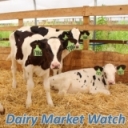
Dairy Market Watch is an educational newsletter to keep producers informed of changing market factors affecting the dairy industry. Dairy Market Watch is published on the last Tuesday of every month, funded in part by Cornell Pro-Dairy, and is compiled by Katelyn Walley-Stoll, Farm Business Management Specialist with the Southwest New York Dairy, Livestock & Field Crops Program.
Weed Control in Wheat and Nitrogen Carrier Issues
Joshua Putman, Field Crops and Forage Specialist
Southwest New York Dairy, Livestock and Field Crops Program

Populations of winter annual weeds will become more prevalent in late March/early April and can compete with wheat and barley and slow the rate of crop development potentially reducing yield. If winter annual weeds like common chickweed, henbit, purple deadnettle, marestail/horseweed, and others emerge with the small grain and are left unchecked, the potential impact on yield could be great.
Certain herbicides can be applied in different nitrogen fertilizer carriers, but timing is critical. Article written by Dwight Lingenfelter with Penn State University.
Nitrogen Applications Being Made to Winter Cereals - How much should you apply?
Joshua Putman, Field Crops and Forage Specialist
Southwest New York Dairy, Livestock and Field Crops Program

Winter cereals like wheat, should have some nitrogen (N), most of the phosphorus (P), and possibly some potassium (K) in the fertilizer band at planting; soil test results should be analyzed before making a decision about P and K application amounts. With recent cool temperatures, spring nitrogen applications are being made across Western NY as growers are able to get across the fields efficiently. When attempting to achieve near-maximum yields of wheat and when diseases can be controlled, the nitrogen rates can be increased to 80 to 90 pounds per acre. The full article on fertilizer rates for winter cereal crops can be found here.
New Self-Paced On-Farm Poultry Processing Course Available
Amy Barkley, Team Leader & Livestock Specialist
Southwest New York Dairy, Livestock and Field Crops Program

This Cornell Small Farms course offers detailed videos and lessons on food safety, processing and humane techniques for dispatching birds. Successfully completing this course will earn a Certificate of Completion. This certificate may be an acceptable option for farm insurance providers that request a training before underwriting a policy for your poultry processing operation.
The Handy Bt-Trait Table for U.S. Corn Production
Joshua Putman, Field Crops and Forage Specialist
Southwest New York Dairy, Livestock and Field Crops Program
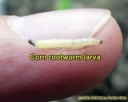
2021 marks the 25th year of commercialization of Bt corn in the United States. The first Bt corn hybrids helped producers control European corn borer, but Bt has come a long way since then. Bt hybrids are now planted on greater than 80% of U.S. corn acres. The benefits of widespread use of Bt hybrids include a reduction in corn borer in the landscape (benefitting conventional corn & vegetables too), and an overall reduction in insecticide use. Producers in SWNY are reviewing seed catalogs to purchase the best corn hybrids for their operation. Some acres in the region are continuous corn and would warrant the need for protection against certain pests such as corn rootworm. This PDF document provides information about the trade names, primary insect targets, and herbicide tolerances for each product. If you have questions about corn traits or placement, contact Josh Putman at 716-490-5572 or jap473@cornell.edu.
Are You Paying Your Employees Well, Or Not? NY Benchmarking Survey
Cornell Agricultural Workforce Development has put together a survey to help farms benchmark their employee compensation against others in NY state. The process is easy and only takes about 10 minutes per employee. Participating in the 2020 Farm Employee Compensation Benchmark will give you the information you need to compare your compensation to other farm businesses and make better compensation plans. There is no cost to participate and farms who provide at least one usable employee entry will receive a report of the results and an invitation to attend a webinar discussion of the findings. All information that you enter will be kept confidential. Only aggregate data, with no way to identify farms or individuals, will be published or shared. For more information on employee compensation, reach out to Katelyn Walley-Stoll, Farm Business Management Specialist.
Dairy Market Watch - February 2021
Katelyn Walley, Business Management Specialist and Team Leader
Southwest New York Dairy, Livestock and Field Crops Program
Dairy Market Watch is an educational newsletter to keep producers informed of changing market factors affecting the dairy industry. Dairy Market Watch is published on the last Tuesday of every month, funded in part by Cornell Pro-Dairy, and is compiled by Katelyn Walley-Stoll, Farm Business Management Specialist with the Southwest New York Dairy, Livestock & Field Crops Program.
Liberty-resistant Palmer amaranth confirmed in Arkansas
Joshua Putman, Field Crops and Forage Specialist
Southwest New York Dairy, Livestock and Field Crops Program

Researchers from the University of Arkansas have identified Palmer amaranth populations that survived several applications of Liberty (glufosinate) Herbicide. Seed was collected and tested in the greenhouse showing a resistance of 16 times the typical field use rate. These findings represent the first documented case of a broadleaf resistance to Liberty Herbicide in the world. Liberty link traits are an additional tool to help corn and soybean producers control problematic weeds like Palmer amaranth, waterhemp, and marestail. Palmer amaranth is now present in 3 counties in New York State, one of which is in Southwest NY. Seed was collected from these populations in the fall of 2020 and are being tested for resistance to our commonly used herbicides. Stay tuned as we conduct research on these NY populations. Full article from the University of Arkansas can be found here.
Planting dicamba-tolerant soybeans in 2021? Options and changes to the labels
Joshua Putman, Field Crops and Forage Specialist
Southwest New York Dairy, Livestock and Field Crops Program

-Written by Mike Hunter, Field Crop Specialist with the North Country Regional Ag Team-
Are you planting dicamba-tolerant (Xtend or XtendFlex Technology) soybeans in 2021? If so, one of the tools in the weed control toolbox will be the option to use one of the three registered dicamba herbicides for use on Xtend or XtendFlex soybeans. In October 2020, the EPA approved a five year registration of XtendiMax and Engenia herbicides. It also extended the registration of Tavium herbicide. Xtendimax, Engenia and Tavium are currently the only dicamba products registered for over-the-top use in dicamba-tolerant soybeans in New York State. There are several updates and changes to the New York labels that can be found on the Cornell Field Crops Blogs. If you have questions about soybean production in 2021, contact Josh Putman at 716-490-5572 or jap473@cornell.edu
Do you have Alfalfa Snout Beetle on your farm?
Joshua Putman, Field Crops and Forage Specialist
Southwest New York Dairy, Livestock and Field Crops Program

-Article written by Dr. Elson Shields, Department of Entomology, Cornell University-
Alfalfa Snout Beetle is a significant problem in Northern NY. When alfalfa snout beetle (ASB) becomes fully established on your farm, its presence cost you $300-$600 per cow annually. The higher producing dairies are hit harder than the lower producing dairies because the higher producing dairies are more reliant on their production of high quality alfalfa and grass forage to maintain their high milk production. This is an unbelievable amount of loss caused by ASB and is ignored by many in the northern New York Agribusiness community. ASB damage is frequently missed and stand loss is often blamed on winter kill. It has not been confirmed in SWNY, but if you feel your alfalfa stands are diminishing quickly, it might be time to look deeper. The full article can be found on Field Crop News.
Ag Value Assessment Reminder
Katelyn Walley, Business Management Specialist and Team Leader
Southwest New York Dairy, Livestock and Field Crops Program
The agricultural value assessment is a program offered to eligible farms that can reduce the property taxes on land that is used for farming. The program has to be applied for annually by March 1st.
Grain Handling and Storage Safety
Joshua Putman, Field Crops and Forage Specialist
Southwest New York Dairy, Livestock and Field Crops Program
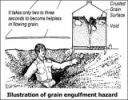
Grain facilities are locations that receive, handle, store, process, and ship bulk agricultural commodities like corn, soybeans, wheat, and oats. In New York, these facilities can be quite large and can handle large quantities of grain products. Additionally, many agricultural producers have their own grain facilities for on-farm storage. The grain handling industry is hazardous because workers can be exposed to serious and life-threatening dangers. Suffocation is the number one cause of death in grain storage bins. There are things that can be done to reduce these hazards. Information and resources can be found on the United States Department of Labor Occupational Safety and Health Administration (OSHA) website.
Invitation to Participate in Agriculture Listening Tour
Katelyn Walley, Business Management Specialist and Team Leader
Southwest New York Dairy, Livestock and Field Crops Program
Newly appointed Senate Ag Committee Chair, State Senator Michelle Hinchey, will be hosting a virtual listening tour during the weeks of February 15 and February 22. If you're interested in participating, visit this site to fill out an interest form by Monday 2/8. This is an opportunity to share your perspective of various issues facing NYS ag on a first-registered, first-served basis.
Microgrant for Dairy Farmers in NY
Alycia Drwencke, Dairy Management Specialist
Southwest New York Dairy, Livestock and Field Crops Program

The new Dairy Forward program is a partnership between American Farmland Trust (AFT) and Chobani. This program aims to help select dairy farm families in New York access information and professional services to help plan for farm transitions in the face of tremendous challenges such as a weak dairy economy, disruptions from severe weather, and an aging farmer population. AFT will make grants of $500 to $5,000 for professional services that further goals associated with farm transfer and succession planning, farm business planning, permanently protecting land, or adopting regenerative farming practices. This is a great opportunity for dairy farm families who are thinking about transitioning their farm to a new generation, hoping to protect their farm, looking to improve farm profitability, or are interested in adopting regenerative practices. Applications are currently available until funds are used up. Funds will be paid directly to business providers.
Dairy Market Watch - January 2021
Katelyn Walley, Business Management Specialist and Team Leader
Southwest New York Dairy, Livestock and Field Crops Program
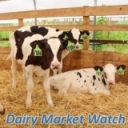
Dairy Market Watch is an educational newsletter to keep producers informed of changing market factors affecting the dairy industry. Dairy Market Watch is published on the last Tuesday of every month, funded in part by Cornell Pro-Dairy, and is compiled by Alycia Drwencke, Dairy Management Specialist with the Southwest New York Dairy, Livestock & Field Crops Program.
Livestock Report - Jan. 22, 2021
Amy Barkley, Team Leader & Livestock Specialist
Southwest New York Dairy, Livestock and Field Crops Program
There have been some shifts in the beef market as of late, and some changes for the year 2021, including increased costs of grain. With corn prices approaching $5.50/bushel, there may be an advantage to running stockers this year. Generally, the trends in the market have been as follows: cull cows have maintained the same price year over year, finished prices have declined, feeders were up $5/cwt in 2020 vs 2019, and bull calf values are up. The details can be found in the full report by Dr. Mike Baker.
Meet our New Faculty Member: Dr. Louis Longchamps
Joshua Putman, Field Crops and Forage Specialist
Southwest New York Dairy, Livestock and Field Crops Program

Dr. Longchamps is an assistant professor in the Soil and Crop Science section of the School of Integrative Plant Science. His academic focus is on precision agriculture, digital agronomy, on-farm experimentation, and soil and crop improvement. He has a Ph.D. in weed science where he focused on weed distribution in corn fields in order to assess the best approach for weed spot spraying technologies. His postdoctoral studies worked to improve nutrient, water, and seed use efficiency by soil mapping and remote sensing. Dr. Longchamps experience will pair nicely with current and new faculty at Cornell University.
Sponsorship opportunity!
The SWNYDLFC program is accepting sponsors for the 2021 year. Sponsors will be advertised in electronic updates and our monthly paper mailings to reach a total of more than 500 households! More information on sponsorship can be found here or contact Kelly Bourne at klb288@cornell.edu or (585) 268-7644 ext. 10.
What does the latest relief package hold for dairy? by John Newton

John Newton, chief economist with the American Farm Bureau Federation recently published an article in Hoard's Dairyman. Newton discusses the latest relief package and what it means for the dairy industry as well as previous government relief. You can read the entire article here.
1-5-2021 Food Industry COVID-19 Update
The New York State Department of Agriculture and Markets recently shared information on the vaccination plan, determining if you are eligible for it, and updates on the quarantine guidelines. More details and resources can be found here.
Calculating Closeouts for Stockers Can Improve Decision-Making and Profitability
Amy Barkley, Team Leader & Livestock Specialist
Southwest New York Dairy, Livestock and Field Crops Program

Most of the stockers in the Northeast are brought in from pasture and sold or begin the finishing process on-farm. Following the transition of those animals, a closeout can be created for each group or pen sold. This evaluation reviews the animals' yearly performance, looking at items including feed intake, death loss, revenue, expenses, and profit/loss and helps to develop an annual record to help make decisions moving into subsequent seasons. The University of Wisconsin has developed a series of open-access close-out spreadsheet to help with the evaluation, which can be found here.
If you are interested in sharing your evaluation, Dr. Mike Baker from Cornell University will use the data to determine the trends on a state-wide basis.
Erie County Farm Businesses: COVID Impact Loan Program Available through ECIDA
Amy Barkley, Team Leader & Livestock Specialist
Southwest New York Dairy, Livestock and Field Crops Program
The Erie County Industrial Development Agency has announced a low-interest loan program for businesses in Erie County needing working capital to take advantage of economic opportunities created by the pandemic. For qualified applicants, the Regional Development Corporation is offering loans from $25,000 - $250,000 at a 1% interest rate. Loans can be used for working capital; accounts receivable/payable; payroll, rent, insurance, and utilities. For more information, call (716) 856-6525 ext 219. For application information, visit www.ecidany.com.
Dairy Market Watch - December 2020
Alycia Drwencke, Dairy Management Specialist
Southwest New York Dairy, Livestock and Field Crops Program
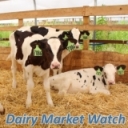
Dairy Market Watch is an educational newsletter to keep producers informed of changing market factors affecting the dairy industry. Dairy Market Watch is published on the last Tuesday of every month, funded in part by Cornell Pro-Dairy, and is compiled by Alycia Drwencke, Dairy Management Specialist with the Southwest New York Dairy, Livestock & Field Crops Program.
Results from post-emergence corn herbicide study on waterhemp
Joshua Putman, Field Crops and Forage Specialist
Southwest New York Dairy, Livestock and Field Crops Program

A summary of 6 years of field research completed in southwestern Ontario Canada found that Callisto + Atrazine, Coverage + Atrazine, Shieldex + Atrazine and Acuron Flexi, applied postemergence in corn, controlled multiple-herbicide-resistant waterhemp 91-92%; Acuron provided the best control with 96%. *Provided by Dr. Peter Sikkema*
Fiber Producer Feedback Needed!
Amy Barkley, Team Leader & Livestock Specialist
Southwest New York Dairy, Livestock and Field Crops Program

Cornell Cooperative Extension Specialists are working to develop a working group for fiber producers. This includes farms focusing on fiber as well as those who are harvesting fiber as a secondary crop from their livestock. Currently, the group is working to understand regional and state challenges within the fiber community to best develop collaboration and education efforts. If you are willing to share your challenges, please fill out this form. Your feedback is greatly appreciated!
NYS Schools Seeking Beef and Pork for Farm to School Programs
Amy Barkley, Team Leader & Livestock Specialist
Southwest New York Dairy, Livestock and Field Crops Program

Schools across NYS are looking for NY raised beef and pork products to use in their school lunch programs. These schools are looking to qualify for the 30% NY Initiative by spending at least 30% of their lunch budget on foods grown, raised, and produced in NY. Farm to School Coordinators and Farm to School support personnel across NYS are looking to source local beef and pork for lunch trays in their local communities. Product type, amount needed, delivery requirements, and price paid varies by school district. Farms interested in participating in the program can reach out to Becky O'Connor, WNY Farm to Institution Coordinator, Cornell Cooperative Extension - Harvest NY: rao84@cornell.edu or (845) 706-0293.
Register for the Virtual CORE Pesticide Training in January
Joshua Putman, Field Crops and Forage Specialist
Southwest New York Dairy, Livestock and Field Crops Program

Join us for another round of CORE training to obtain your pesticide license or receive 1.75 DEC recertification credits in the CORE category. Register online for January 12th from 9am - 10:50am or January 14th from 11am - 12:50pm for only $20. We will provide an overview of the basic information involved in the pesticide application certification process and will present the basics of Integrated Pest Management (IPM) as well as general pesticide safety, regulations and pesticide resistance. *IMPORTANT NOTE* Because of COVID-19, the DEC did not require growers whose licenses expired in November of 2019 or later to renew their applicator's license in order to buy & spray restricted use materials during the 2020 growing season. That discretionary policy is no longer in effect. If your license expired between November 2019 and November 23, 2020, you must obtain the full number of recertification credits and renew your license by February 23, 2021. If your license expires after November 23, 2020, you will follow the typical DEC guidelines. Feel free to contact Josh Putman with any questions. We hope to see you there!
What's new from CALS at Cornell University?
Joshua Putman, Field Crops and Forage Specialist
Southwest New York Dairy, Livestock and Field Crops Program
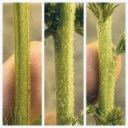
Horticulture Weed Scientist, Dr. Lynn Sosnoskie, has been conducting some interesting research over the past few months. Extension specialists from all around the state collected and submitted weed specimens for herbicide-resistance testing to better understand the best management practices for these weeds in field crops. Such species included marestail, Powell amaranth, waterhemp, and Palmer amaranth. In addition, Dr. Sosnoskie is working closely with Dr. Yu Jiang to develop a pocket Pigweed ID guide for growers. They are taking 3D images of the weeds at seedling stage all the way to flowering. This information and these tools will help growers maintain crop yields and apply the right herbicide chemistries to their fields.
Virtual CORE Pesticide Training and DEC Recertification
Joshua Putman, Field Crops and Forage Specialist
Southwest New York Dairy, Livestock and Field Crops Program

*IMPORTANT NOTE* Because of COVID-19, the DEC did not require growers whose licenses expired in November of 2019 or later to renew their applicator's license in order to buy & spray restricted use materials during the 2020 growing season. That discretionary policy is no longer in effect. If your license expired between November 2019 and November 23, 2020, you must obtain the full number of recertification credits and renew your license by February 23, 2021. If your license expires after November 23, 2020, you will follow the typical DEC guidelines.
The Results are in for SWNY! Soybean Cyst Nematode Distribution in the State
Joshua Putman, Field Crops and Forage Specialist
Southwest New York Dairy, Livestock and Field Crops Program
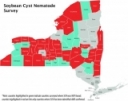
-Information prepared by Jaime Cummings, NYS Integrated Pest Management Program-
The 2020 statewide SCN survey revealed 23 NEW counties confirmed with at least one field positive for SCN. In SWNY, 3 out of 5 counties tested positive for SCN (Steuben, Allegany, and Chautauqua). This brings us to a total of 30 counties with SCN confirmations since 2016. The maps below illustrate the progress and results of our SCN testing over the past few years. Additional resources about SCN can be accessed at: https://www.thescncoalition.com/resources/tools-to-download. Also, check out these short videos titled "Let's Talk Todes" to learn more about managing soybean cyst nematode.
Dairy Market Watch - November 2020
Alycia Drwencke, Dairy Management Specialist
Southwest New York Dairy, Livestock and Field Crops Program
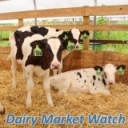
Dairy Market Watch is an educational newsletter to keep producers informed of changing market factors affecting the dairy industry. Dairy Market Watch is published on the last Tuesday of every month, funded in part by Cornell Pro-Dairy, and is compiled by Alycia Drwencke, Dairy Management Specialist with the Southwest New York Dairy, Livestock & Field Crops Program.
Farmland: To Purchase or to Lease?
Amy Barkley, Team Leader & Livestock Specialist
Southwest New York Dairy, Livestock and Field Crops Program

This year's growing season is coming to a rapid close. In thinking to the year ahead, how, where, and at what scale we want to farm may come back under the lens of consideration. Perhaps there is an opportunity to increase forage and crop production by expanding into more acreage. Maybe a chance to get into farming has presented itself. Whether you are looking to start a farm or are a seasoned farmer looking to expand the acreage of your enterprise, you can choose to either lease or purchase land.
End-of-Season Combine Clean-out Recommendations
Joshua Putman, Field Crops and Forage Specialist
Southwest New York Dairy, Livestock and Field Crops Program

For many growers in Southwest New York, fall harvest is coming to an end. Now is the time to prepare harvest equipment for winter storage. Proper preparation reduces the likelihood of animals nesting in the equipment which can lead to electrical damage resulting in fire, improves the function and longevity of parts, and puts a closure to the 2020 growing season.
Spotted Lanternfly Confirmed Found in NYS
Amy Barkley, Team Leader & Livestock Specialist
Southwest New York Dairy, Livestock and Field Crops Program

The Spotted Lanternfly, a foreign pest known to be highly destructive in crops including maple trees, apple trees, grape vines, and hops, has been identified on Staten Island, areas of the Hudson Valley, and in the Southern Tier. Monitoring is ongoing, and the public is urged to continue to report findings of the insects and egg masses through the colder months to Ag and Markets at spottedlanternfly@agriculture.ny.gov. Early reporting can help with the development of targeted management plans to slow the establishment and spread of this insect.
Managing Corn Rootworm and a New Control Option for New York Farmers
Joshua Putman, Field Crops and Forage Specialist
Southwest New York Dairy, Livestock and Field Crops Program
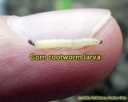
Biological Control of Corn Rootworm with Persistent Entomopathogenic Nematodes: An opportunity to try them on your farm
*Elson Shields, Entomology, Cornell University, Ithaca, NY
Corn rootworm (CRW) is the number one pest of corn in both NY and the U.S. Recent NY field data are showing that the biocontrol nematodes being released against alfalfa snout beetle are also having an impact on CRW after the field is rotated from alfalfa into corn. Research in NNY for the past 18 years has shown that a single field application of persistent biocontrol nematodes inoculates the field for multiple years and across rotations. In 75 fields following a typical alfalfa-corn rotation, not only did the biocontrol nematodes persist for multiple years at sufficient populations to suppress soil insects, but biocontrol nematode populations were higher after 4-years of corn than in the alfalfa before being rotated to corn. These results suggested the biocontrol nematodes were attacking CRW during the corn years of the rotation.
NY Farm Service Agency to Host Meetings on Coronavirus Food Assistance Program 2
Amy Barkley, Team Leader & Livestock Specialist
Southwest New York Dairy, Livestock and Field Crops Program

The U.S. Department of Agriculture's (USDA) Farm Service Agency (FSA) in New York is hosting two meetings about the Coronavirus Food Assistance Program 2 (CFAP 2). The first meeting will be Tuesday, November 17th at noon, and the second, which will focus on the specialty crops portion of CFAP 2, will be Wednesday, November 18th at noon. FSA is accepting applications for CFAP 2 through December 11, 2020. To find the latest information on CFAP 2, eligible crops, payment rates, and the application and payment calculator, visit farmers.gov/cfap.
2020 Corn Silage Overview Available
Joshua Putman, Field Crops and Forage Specialist
Southwest New York Dairy, Livestock and Field Crops Program

2020 Corn Silage Overview Available
-Provided by Joe Lawrence and Allison Kerwin - PRO-DAIRY at Cornell and Department of Animal Science-
The 2020 NY & VT Corn Silage Hybrid Evaluation Program Report is now available. The growing season across much of the Northeast started out with below average temperatures, but despite the cool start, good growing conditions allowed for a timely fall harvest. Each year brings its own challenges and opportunities. It is important to evaluate the data in the context of your own farm when selecting corn hybrids. The top performing hybrid at any location may not be a good fit for another location or soil type. The PDF version can be accessed here or for additional information about hybrid performance and placement, contact Josh Putman at jap473@cornell.edu or 716-490-5572.
Important Notice for Licensed Pesticide Applicators!
Joshua Putman, Field Crops and Forage Specialist
Southwest New York Dairy, Livestock and Field Crops Program

Important Notice for Licensed Pesticide Applicators!
Because of COVID-19, the NYS DEC did not require growers whose licenses expired in November of 2019 or later to renew their applicator's license in order to buy & spray restricted use materials during the 2020 growing season. That discretionary policy is no longer in effect. If your license expired between November 2019 and Nov. 23, 2020, you must obtain the full number of recertification credits and renew your license. Starting Nov. 24, 2020, you cannot to buy or apply pesticides until your license has been renewed. The DEC is giving growers a 90-day grace period before adding penalty credits to overdue renewal applications. Growers should complete COVID-delayed license renewals by February 23, 2021. If your license expires after Nov. 23, 2020, you will follow the typical DEC renewal process.
Preparing for Dairy Calf Care in Winter
Alycia Drwencke, Dairy Management Specialist
Southwest New York Dairy, Livestock and Field Crops Program
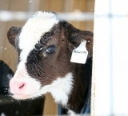
With temperatures dropping and the first snow flying, it is important to confirm farms are ready for the winter. While animal care is a top priority for dairy farms year round, there are some additional considerations to keep in mind during cold months, especially for vulnerable groups like calves. Ensuring our calf care is up to date for the winter season can set them up for success in the future. For more information on preparing calves for winter, read this article or reach out to Alycia Drwencke, Dairy Management Specialist.
EPA Announces 2020 Dicamba Registration Decision
Joshua Putman, Field Crops and Forage Specialist
Southwest New York Dairy, Livestock and Field Crops Program

EPA Announces 2020 Dicamba Registration Decision
October 27, 2020 — On Tuesday, U.S. Environmental Protection Agency (EPA) Administrator Andrew Wheeler announced that EPA is approving new five-year registrations for two dicamba products and extending the registration of an additional dicamba product. All three registrations include new control measures to ensure these products can be used effectively while protecting the environment, including non-target plants, animals, and other crops not tolerant to dicamba. "With today's decision, farmers now have the certainty they need to make plans for their 2021 growing season," said EPA Administrator Andrew Wheeler. "After reviewing substantial amounts of new information, conducting scientific assessments based on the best available science, and carefully considering input from stakeholders we have reached a resolution that is good for our farmers and our environment."
Dairy Market Watch - October 2020
Alycia Drwencke, Dairy Management Specialist
Southwest New York Dairy, Livestock and Field Crops Program
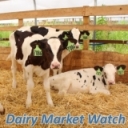
Dairy Market Watch is an educational newsletter to keep producers informed of changing market factors affecting the dairy industry. Dairy Market Watch is published on the last Tuesday of every month, funded in part by Cornell Pro-Dairy, and is compiled by Alycia Drwencke, Dairy Management Specialist with the Southwest New York Dairy, Livestock & Field Crops Program.
Corn Diseases and Mycotoxin Contamination of Corn Grain in Southwest New York
Joshua Putman, Field Crops and Forage Specialist
Southwest New York Dairy, Livestock and Field Crops Program

Mycotoxin is a general term for a poison produced by a fungus and can be toxic when inhaled, absorbed through the skin, or consumed at very low concentration levels. Corn and small grain cereals are especially prone to mycotoxin accumulation in their seed tissue. In the past, it was believed that the fungus affected grain only during the postharvest stage, particularly when grain was stored under suboptimal conditions (hot and humid/moist). Although these factors can promote fungal growth in storage, this occurs during the growing season as well.
Ten Things You Should Know Before Leasing Land for Solar Development
Amy Barkley, Team Leader & Livestock Specialist
Southwest New York Dairy, Livestock and Field Crops Program

Development of land for solar energy projects is becoming common across the state of New York. These large projects require land leases from landowners, which can extend 40-50 years. While leasing land for solar development can provide supplemental income to a landowner, there are some things to keep in mind before signing your name on the dotted line. Daniel Brockett of Penn State Extension and George Thompson of Wilson, Thompson, and Cisek, LLC, help bring some of these important considerations to light.
Dairy x Beef Use in NY Survey
Alycia Drwencke, Dairy Management Specialist
Southwest New York Dairy, Livestock and Field Crops Program

Do you use Dairy x Beef genetics? Do you work with a farm that does? CCE needs your help! The usage of beef on dairy has steadily grown over the last few years and we are working towards understanding the trends and markets of this strategy in NYS. Please consider filling out this survey: https://cornell.ca1.qualtrics.com/jfe/form/SV_4HHU14xa0XN4xg1. Which will take approximately 15 minutes to take. The survey can also be started and accessed later for completion. For questions, please contact Margaret Quaassdorff (maq27@cornell.edu) or Betsy Hicks (bjh246@cornell.edu), Regional Dairy Specialists with Cornell Cooperative Extension.
Fall Feeder Calf Prices Expected to be Equal to or Slightly Higher Than 2019
Amy Barkley, Team Leader & Livestock Specialist
Southwest New York Dairy, Livestock and Field Crops Program

The most recent beef market report indicates that strong consumer demand for beef is continuing to support stable beef prices for NYS farmers. Unfortunately, a local major packer had to temporarily close earlier in the month, resulting in reduced prices for cull cows, which exceeds the typical seasonal decline in price. Prices for finished cattle are slightly lower than this time last year. Feeder prices are promising, with projections indicating that 550 lbs feeders will trade either at or above last year's prices. Bull calf values continue to improve on average, with premiums for beef cross bull calves bringing in $69/head more than Holstein bull calves. More can be read in Dr. Mike Baker's Livestock Report, here: https://cpb-us-e1.wpmucdn.com/blogs.cornell.edu/dist/3/3955/files/2020/10/LivestockUpdateOct-2-2020.pdf.
Dairy Margin Coverage Program Enrollment for 2021 Began Oct. 13
Alycia Drwencke, Dairy Management Specialist
Southwest New York Dairy, Livestock and Field Crops Program

The U.S. Department of Agriculture (USDA) began accepting applications for the Dairy Margin Coverage (DMC) program on Tuesday, October 13, 2020 for 2021 enrollment. Signup runs through Dec. 11, 2020. DMC is a voluntary risk management program that offers protection to dairy producers when the difference between the all-milk price and the average feed price (the margin) falls below a certain dollar amount selected by the producer. DMC payments triggered for seven months in 2019 and three months so far in 2020. For more information, visit farmers.gov DMC webpage, or contact your local USDA Service Center. To locate your local FSA office, visit farmers.gov/service-center-locator. In the Southwest NY region, the county offices can be reached at: Allegany (585) 268-5133; Cattaraugus (716) 699-2375; Chautauqua (716) 664-2351; Erie (716) 652-1400; Steuben (607) 776-7398.
Online Dairy Feeder School in English and Spanish Scheduled for November 2020
Alycia Drwencke, Dairy Management Specialist
Southwest New York Dairy, Livestock and Field Crops Program

Cornell Cooperative Extension's Regional Dairy Specialists and Cornell PRO-DAIRY would like to invite dairy producers, employees, and agribusiness professionals across the state to join a webinar focused on management practices for feeding cows and heifers. This virtual learning opportunity will be offered as a two-day event in English on Tuesday, November 3rd and Thursday, November 5th from 1pm - 2:30pm. The same information will be presented in Spanish on Tuesday, November 10th and Thursday, November 12th from 1pm - 2:30pm. Registration is required ahead of time by visiting https://tinyurl.com/y6bqfjyq. Thanks to generous sponsors, registration fees have been covered.
Commissioner Ball Shares Reminder to Agribusinesses on NY Forward Guidance
Amy Barkley, Team Leader & Livestock Specialist
Southwest New York Dairy, Livestock and Field Crops Program

Commissioner Ball is reminding agritourism businesses of the importance of following NY-Forward Guidance, including those which offer pick-your-own fruits and vegetables, hayrides, corn mazes, and other fall activities. Strict enforcement of the facial covering, social distancing, and reduced capacity mandates is being implemented across all industries in NY. Best practices for low-risk outdoor activities can be reviewed here: https://smallfarms.cornell.edu/resources/farm-resilience/best-management-practices-for-agritourism-covid/
Dairy Market Watch - September 2020
Alycia Drwencke, Dairy Management Specialist
Southwest New York Dairy, Livestock and Field Crops Program
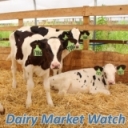
Dairy Market Watch is an educational newsletter to keep producers informed of changing market factors affecting the dairy industry. Dairy Market Watch is published on the last Tuesday of every month, funded in part by Cornell Pro-Dairy, and is compiled by Alycia Drwencke, Dairy Management Specialist with the Southwest New York Dairy, Livestock & Field Crops Program.
Preventing the Spread of Troublesome Weeds at Harvest in Southwest New York
Joshua Putman, Field Crops and Forage Specialist
Southwest New York Dairy, Livestock and Field Crops Program

-Article information adapted from PennState Extension written by Dr. John Wallace and Heidi Reed-
Resistant weeds cause significant yield loss, increased production costs, and are becoming a bigger problem every year in New York. Farmers rarely proactively manage weeds to prevent or delay selection for herbicide resistance. They usually increase the adoption of integrated weed management practices only after herbicide resistance has occurred. Our most problematic herbicide-resistant weeds, like horseweed (marestail), waterhemp, and Palmer amaranth, can easily spread from one field, or one farm, to the next, as seeds get trapped in/on tillage, planting, and harvest equipment and ride field-to-field this time of year.
NESARE Invites Applicants for their 2021 Farmer Grant Program
Amy Barkley, Team Leader & Livestock Specialist
Southwest New York Dairy, Livestock and Field Crops Program
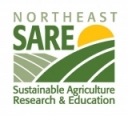
Northeast SARE is now accepting applications for its Farmer Grant Program. Up to $15,000 is available per project. The online system opens on Oct. 1 and applications are due by 5 p.m. on Nov. 17, 2020. The Farmer Grant Program funds farmers to explore new concepts in sustainable agriculture on production, marketing, labor, farm succession, social capital and other areas through experiments, surveys, prototypes, on-farm demonstrations or other research and education techniques. Grants may not be used to help start or expand farm businesses. Application materials, including detailed instructions and supporting documents, are posted at www.northeastsare.org/FarmerGrant. A webinar on how to apply is scheduled for Tuesday, October 6 from 12pm - 1pm. Please contact Amy Barkley, Livestock and Beginning Farm Specialist, at 716-640-0844 or amb544@cornell.edu if you are interested in applying for a SARE Farmer Grant.
Local Frost Advisories - What it Could Mean for Corn Producers in Southwest New
Joshua Putman, Field Crops and Forage Specialist
Southwest New York Dairy, Livestock and Field Crops Program

Frost can mean yield loss for crop producers, although the severity of damage varies based on crop maturity, topographical features and local climate conditions. A corn-killing freeze occurs when temperatures fall to 32 F for several hours or 28 F for a few minutes.
National Milk Producers Federation CFAP2 Dairy Farm Toolbox
Alycia Drwencke, Dairy Management Specialist
Southwest New York Dairy, Livestock and Field Crops Program

The National Milk Producers Federation (NMPF) has released a toolbox for dairy farms looking to apply for the second round of CFAP. The toolbox includes a breakdown of what the latest Coronavirus Food Assistance Program includes for dairy, as well as a link to relevant application resources. Farms seeking one-on-one support with the CFAP 2 application process can call 877-508-8364 to speak directly with a USDA employee ready to offer assistance. Although, it is recommended to first contact your local Farm Service Agency (FSA) office.
Second Round of Coronavirus Food Assistance Program for Farms Now Available
Alycia Drwencke, Dairy Management Specialist
Southwest New York Dairy, Livestock and Field Crops Program

The USDA's Farm Service Agency's (FSA) recently opened the second round of Coronavirus Food Assistance Program (CFAP) for agricultural businesses. If you are an agricultural producer whose operation has been affected by COVID-19, you are likely eligible for this second round of support. FSA will accept applications from September 21 - December 11, 2020 from agricultural businesses for this support. A full list of eligible commodities can be found here. For more information, or to apply, visit www.farmers.gov/cfap or contact your local FSA office. In the Southwest NY region, the county offices can be reached at: Allegany (585) 268-5133; Cattaraugus (716) 699-2375; Chautauqua (716) 664-2351; Erie (716) 652-1400; Steuben (607) 776-7398.
So, You Want to Start a Farm? Resource Directory
Katelyn Walley, Business Management Specialist and Team Leader
Southwest New York Dairy, Livestock and Field Crops Program
A comprehensive collection of resources for beginning farmers as they embark on their information searching journey to start a farm business in SWNY. Information and resources compiled by Katelyn Walley-Stoll, Farm Business Management Specialist and Team Leader, Cornell Cooperative Extension's Southwest New York Dairy, Livestock, and Field Crops Program. Funding for this project provided by the State of New York and American Farmland Trust. Updated April 2021. For more information or further questions and inquiries, call 716-640-0522.
Dairy Farm Business Summary Highlights Factors Associated with Variations in Ear
Katelyn Walley, Business Management Specialist and Team Leader
Southwest New York Dairy, Livestock and Field Crops Program
The Dairy Farm Business Summary is a free, voluntary, and confidential program offered by PRO-DAIRY and Cornell Cooperative Extension. PRO-DAIRY's Jason Karszes recently released an overview of 2019 data to highlight trends from farms divided by profitability quartiles. The average rate of return on capital without appreciation increased from 1.1 percent in 2018 to 5.6 percent in 2019. For more information, or to complete a Dairy Farm Business Summary for your own operation, contact Katelyn Walley-Stoll, Farm Business Management Specialist.
Dialing into your Best Dairy: Neonate Phase
Alycia Drwencke, Dairy Management Specialist
Southwest New York Dairy, Livestock and Field Crops Program
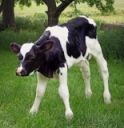
Many years of research have demonstrated that from birth to weaning is a critical period in the dairy animal's life and the management decisions made during this time could have long term effects on that calf's future performance, health, and productivity. Several key management tips have been highlighted in an article by Casey Havekes and Alycia Drwencke, Dairy Management Specialists with the North Country Regional Ag Team and the Southwest NY Dairy, Livestock and Field Crops Team. These management strategies should be considered to maximize the success of the neonate period. You can read the full article here or reach out to Alycia Drwencke with questions.
Dialing into your Best Dairy: Reproduction, Gestation and the Dry Period
Alycia Drwencke, Dairy Management Specialist
Southwest New York Dairy, Livestock and Field Crops Program

Cornell Cooperative Extension Regional Dairy Management Specialists, Alycia Drwencke, Casey Havekes, and Lindsay Ferlito have put together some considerations for managing your herd. Dialing into your best dairy and reaching your herd's genetic potential includes focusing on reproduction, gestation, and the dry period. For tricks on managing these life stages, check out the full article or reach out to Alycia Drwencke.
Price Risk Management for Dairy Farmers Webinar Series
Katelyn Walley, Business Management Specialist and Team Leader
Southwest New York Dairy, Livestock and Field Crops Program
The Capital Area Agricultural & Horticultural Program is partnering with Cornell PRO-DAIRY and NY FarmNet to host a series of two webinars in November for dairy producers. The first webinar will be on November 3rd and will cover Dairy Margin Coverage, Forward Contracting, and Determining if Risk Management is Right for my Farm. The second webinar will be on November 10th and will talk about Dairy Revenue Protection, more on Forward Contracting, and Dairy Farmer Experience with Forward Contracting. The cost to attend is $10 per farm for both sessions, and the webinars will be from 7pm - 9pm each evening. Register here. Price Risk Management is becoming an increasingly important topic, especially as we reflect on the many ups and downs of 2020 so far.
Racial Equity Tool Kit for Farmers Available
Katelyn Walley, Business Management Specialist and Team Leader
Southwest New York Dairy, Livestock and Field Crops Program
The National Young Farmers Coalition has recently compiled a Racial Equity Tool Kit designed to be a starting point for agricultural communities across the country. It aims to orient and incite members (and those in the broader agricultural industry) toward preliminary awareness and direct action. This is a great initial resource for folks to look though, and offers thoughtful ideas around partnering with BIPOC-led organizations and groups, creating a network for resource sharing, and actively practicing allyship.
Monitoring Fields for Soybean Cyst Nematode in Southwest NY
Joshua Putman, Field Crops and Forage Specialist
Southwest New York Dairy, Livestock and Field Crops Program

We need your help! Take the test. Beat the pest.
Soybean Cyst Nematode (SCN) is the most destructive pest of soybean in the United States. Yield losses in soybean due to SCN have been estimated at more than $1 billion annually in the U.S. Because the nematode can be present in fields without causing obvious aboveground symptoms, yield losses caused by SCN are often underestimated.
Consider Planting Winter Wheat After the Hessian Fly-Free Date
Joshua Putman, Field Crops and Forage Specialist
Southwest New York Dairy, Livestock and Field Crops Program

As fall approaches, growers should consider the recommended timing for planting winter wheat. For years, the standard recommendation for profitable wheat production in New York has been to plant wheat after the Hessian fly-free date. This recommendation is based on the fact that Hessian fly adults would no longer be alive as there are no remedial measures available to save an infested crop. An article prepared by Ken Wise, with the New York State Integrated Pest Management Program, discusses the recommend timing to plant wheat to avoid injury from the Hessian fly as well as a detailed description about this pest. For more information about winter cereal production, contact Josh Putman at 716-490-5572 or jap473@cornell.edu.
Deadline Approaching for USDA's Coronavirus Food Assistance Program
Katelyn Walley, Business Management Specialist and Team Leader
Southwest New York Dairy, Livestock and Field Crops Program

U.S. Department of Agriculture (USDA) Farm Service Agency (FSA) reminds farmers and ranchers that the deadline to apply for the Coronavirus Food Assistance Program (CFAP) is Sept. 11, 2020. This program provides direct relief to producers who faced price declines and additional marketing costs due to COVID-19.
Design Your Succession Plan Series Announced!
Katelyn Walley, Business Management Specialist and Team Leader
Southwest New York Dairy, Livestock and Field Crops Program

"Empowering families to get started on their succession plan."
Online Zoom Series Coming to NYS!
In NYS the program will be offered as a 4-evening remote course via Zoom in conjunction with an online learning platform to be used between meetings. The program will run from 6:30-8 p.m. October 8th, 15th 22nd and 29th.
Don't Forget to Complete the 2020 Census!
Alycia Drwencke, Dairy Management Specialist
Southwest New York Dairy, Livestock and Field Crops Program

Have you completed the 2020 Census? Completing the 2020 Census will determine where over $675 billion in federal funding is spent in states and communities for the next ten years. When filling out the Census, your personal information is kept confidential by law. Whether it's funding in communities across your state or helping determine the number of seats your state will have in the U.S. House of Representatives—every count makes an equal impact. Be sure you are counted and visit 2020Census.Gov for more information.
Governor Cuomo Announces New State Guidelines for Agritourism
Amy Barkley, Team Leader & Livestock Specialist
Southwest New York Dairy, Livestock and Field Crops Program

On September 1st, Governor Cuomo announced new state guidance, aligning with NY Forward requirements, for corn mazes, pick-your-own fruit and vegetable operations, hayrides, and haunted houses. Outlined are safety precautions for these operations to take during the upcoming fall season. Read the full guidance here for more information.
Corn Silage Harvest
Joshua Putman, Field Crops and Forage Specialist
Southwest New York Dairy, Livestock and Field Crops Program

Corn silage harvest is under way in New York. An article recently published by Cornell CALS PRO-DAIRY, describes the Corn Silage Processing Score (CSPS), implementation of kernel processing, and how to monitor processor performance. In a second article, they explain the effect of corn plant characteristics on corn silage processing scores. Listen to the newly published PODCAST series titled "Corn Silage Harvest Considerations." For more information, contact Field Crops Specialist Josh Putman.
2020 Changes to New York Farm Labor Laws: Recording & Presentation
New York's farm labor laws changed greatly with the 2019 Farm Laborer Fair Labor Practices Act (FLFLPA), the laws changed again this year when several amendments were included in the Budget Act in 2020. On August 17, 2020, Cornell Ag Workforce Development and Northeast Dairy Producers Association (NEDPA) recorded a webinar to help all farmers understand the changes. Find below links to a PDF of the presentation with active links and a recording of "2020 Updates to New York Farm Labor Laws."
- Link to a PDF of the meeting presentation, including links to additional information
- Link to a recording of the webinar
NYS Forage Exchange Website Announced
Joshua Putman, Field Crops and Forage Specialist
Southwest New York Dairy, Livestock and Field Crops Program

The NYS Forage Exchange provides a free system to match potential sellers and buyers of forage within New York State. Sellers can easily register within the system and then post the forage they have available to sell. Potential purchasers can browse the advertisements, and then contact the seller through email for additional information or to complete purchase arrangements.
Onboarding Dairy Employees 2020: Safe, Productive and Engaged from Day One

Employee training and retention can be difficult on farms. Cornell Agricultural Workforce Development is seeking dairy farmers to participate in the second year of an onboarding project funded by the New York Farm Viability Institute. Over the next year, the Ag Workforce Development Team will partner with 25 farms in a three-session Zoom series to develop onboarding materials, trainings and methods. If your farm is looking for a way to improve employee retention and increase overall productivity of employees, contact Richard Stup, Cornell Agricultural Workforce Development, at res396@cornell.edu, Alycia Drwencke, Dairy Management Specialist or Katelyn Walley-Stoll, Farm Business Management Specialist.
Managing Employee Workloads
Katelyn Walley, Business Management Specialist and Team Leader
Southwest New York Dairy, Livestock and Field Crops Program
There are many hands at work on the farm, and oftentimes it can feel like there just aren't enough around! Balancing the constant demands of farming with well-balanced employee workloads can be challenging, especially in light of Farm Labor Law requirements. Cornell Pro-Dairy has a helpful tool that is useful for scheduling the activities of individuals to help avoid underemployment and employee burnout.
Beef Farm Business Summary (BFBS) Helps Farmers Calculate Cost of Production, Tr
Katelyn Walley, Business Management Specialist and Team Leader
Southwest New York Dairy, Livestock and Field Crops Program
BFBS is a free and confidential program that is now available to livestock producers across the state, including our Southwest New York Region. This is an opportunity to collect data on individual farms and analyze the profitability of the businesses. Farm Business Management Specialist, Katelyn Walley-Stoll, will work with farms to determine what information is needed and complete the analysis, providing the farm with an opportunity to look at areas of production, develop plans to increase profitability, track business growth over time, and calculate a cost of production.
Dairy Farm Business Summary Progress Report Released by Cornell PRO-DAIRY
Katelyn Walley, Business Management Specialist and Team Leader
Southwest New York Dairy, Livestock and Field Crops Program
The fourth and final progress report of the Dairy Farm Business Summary has been released for 2019. As dairy businesses across the state continue to analyze their financial and business performance utilizing the Dairy Farm Business Summary and Analysis Program, updated progress of the farm reports are provided to review the changes that have occurred from 2018 to 2019.
If you are interested in participating in the Dairy Farm Business Summary Program contact Katelyn by calling 716-640-0522.
Register for the Virtual Cornell Hemp Field Day
Joshua Putman, Field Crops and Forage Specialist
Southwest New York Dairy, Livestock and Field Crops Program

Due to COVID-19 safety restrictions, this year's Hemp Field Day is being presented virtually. Pre-Register now to attend this event!
SWNY Field Crop Chronicle - 8/5/2020
Joshua Putman, Field Crops and Forage Specialist
Southwest New York Dairy, Livestock and Field Crops Program

The Southwest NY Diary, Livestock, Field Crops Program is excited to announce a new method of delivering field crop topics and information!
Dairy Market Watch - July 2020
Katelyn Walley, Business Management Specialist and Team Leader
Southwest New York Dairy, Livestock and Field Crops Program
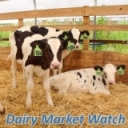
Dairy Market Watch is an educational newsletter to keep producers informed of changing market factors affecting the dairy industry. Dairy Market Watch is published on the last Tuesday of every month, funded in part by Cornell Pro-Dairy, and is compiled by Katelyn Walley-Stoll, Business Management Specialist with the Southwest New York Dairy, Livestock & Field Crops Program.
Heat Stress Webinar Recording - English and Spanish
Alycia Drwencke, Dairy Management Specialist
Southwest New York Dairy, Livestock and Field Crops Program

Did you miss the recent heat stress webinars in English and Spanish? Not to worry! You can watch the recordings here:
English-Heat Stress: Key Indicators and Management Strategies
Spanish-Estrés por Calor en Vacas Lecheras: Señales Claves y Estrategias de Manejo
For additional information on heat stress, reach out to dairy management specialist, Alycia Drwencke.
Farm Aid Northeast BIPOC Farmers Relief Fund
Katelyn Walley, Business Management Specialist and Team Leader
Southwest New York Dairy, Livestock and Field Crops Program
The Northeast BIPOC Farmer Relief Fund is now accepting applications from BIPOC (Black, Indigenous and People of Color) folks living in the Northeast who work in agriculture and have been economically impacted by the COVID crisis.
Early-Season Corn Disease: Northern Corn Leaf Blight
Joshua Putman, Field Crops and Forage Specialist
Southwest New York Dairy, Livestock and Field Crops Program

In 2019, northern corn leaf blight (NCLB) appeared throughout the Southwest New York region. Weather conditions in 2020 are favorable and might lead to disease infestations in SWNY.
Don't Miss Out On The Next CORE Pesticide Training July 21st, 6PM-7:50PM!
Joshua Putman, Field Crops and Forage Specialist
Southwest New York Dairy, Livestock and Field Crops Program

Our first online CORE pesticide training was a huge success with great participation from the group. The SWNY Dairy, Livestock, and Field Crops team is hosting a second training this coming Tuesday, July 21, from 6-7:50PM.
Heat-Stress and Lack of Moisture on Corn and Soybeans in SWNY
Joshua Putman, Field Crops and Forage Specialist
Southwest New York Dairy, Livestock and Field Crops Program

Last week, SWNY was experiencing severe heat as well as symptoms of drought stress and seen in many crops. Corn leaves were rolling, soybean leaves were flipped, leaf tissue was turning grey, and there was no sight of rain.
Silage Safety Resources
Alycia Drwencke, Dairy Management Specialist
Southwest New York Dairy, Livestock and Field Crops Program

With 2nd cutting of hay well under way or finished and corn silage harvest quickly approaching, it is important to revisit silage safety. Lallemand Animal Nutrition has released a few safety resources for farm this harvest season. They are also willing to perform individualized training on farm. For additional questions on silage safety, reach out to Dairy Management Specialist, Alycia Drwencke or Field Crops Specialist, Josh Putman.
Changes Announced to the Paycheck Protection Program
Katelyn Walley, Business Management Specialist and Team Leader
Southwest New York Dairy, Livestock and Field Crops Program
Extension Specialists Elizabeth Higgins, Nicole Tommell, and Myron Thurston have developed an updated Fact Sheet regarding the new PPP Flexibility Act, which came into law on 7/5. Additionally, the Small Business Administration will be hosting two webinars outlining these changes on Wednesday, July 15th and Wednesday, July 29th. Some key changes to the program include:
- Businesses may now spend the funds over a 24 week period (this was only 8 week previously) and get 100% loan forgiveness.
- There are exemptions provided for good faith efforts to keep your 2020 FTE numbers at 2019 levels (ie - some workers don't want to/aren't' able to return to work).
- The amount that needs to be spent on payroll has been reduced from 75% to 60%. The other 40% is eligible to cover utilities, interest, etc.
- There is still $100 billion+ left in the program, so it has been extended.
- If you're eligible to apply for PPP and still haven't, work with your lender to get your application in.
Managing the Heat is Important for People, too!
Katelyn Walley, Business Management Specialist and Team Leader
Southwest New York Dairy, Livestock and Field Crops Program
While we often think about our livestock's health, our corn yields decreasing, and our equipment overheating in times of drought and high heat, it's important to remember that people are susceptible to heat stress, too!
Dicamba Notice to Users, Distributors and Sellers - June 29, 2020
Joshua Putman, Field Crops and Forage Specialist
Southwest New York Dairy, Livestock and Field Crops Program

On June 3, 2020, the United States Court of Appeals for the Ninth Circuit vacated EPA's registration of three products containing the active ingredient dicamba, which effectively cancelled their federal registrations. The three products are: Xtendimax with Vaporgrip Technology, Engenia, and FeXapan.
On June 8, 2020, in response to the Court's decision, EPA issued a Cancellation Order for these three products. In light of the Court's decision associated with these registrations and the provisions of EPA's Cancellation Order to implement that decision, DEC is taking these actions:
1) Registrations - The registrations of the three products will be cancelled as of July 31, 2020 in accordance with the provisions of ECL Section 33-0713. Thirty days' notice will be provided to the registrants of these products.
2) Distribution or Sale - Distribution or sale of existing stocks of the three products shall be limited as follows:
- Distribution or sale by registrants is prohibited immediately, except for distribution for the purposes of proper disposal.
- Distribution or sale of products that are already in the possession of someone other than the registrant is permitted only for disposal or to facilitate return to the registrant or a registered establishment.
- Distribution or sale by commercial applicators is permitted to facilitate use no later than July 31, 2020.
3) Use - All use, including storage of open containers, is prohibited after July 31, 2020.
Questions about dicamba may be directed to pesticidecompliance@dec.ny.gov or ppr@dec.ny.gov or by calling 518-402-8727.
Identifying Risk is the First Step to Managing It
Katelyn Walley, Business Management Specialist and Team Leader
Southwest New York Dairy, Livestock and Field Crops Program
The South Central NY Dairy & Field Crops Team recently shared information on identifying risk on the farm - the first step to managing it! Many farms have taken a closer look at their risk management efforts in light of the COVID-19 pandemic and its market disruptions. Risk Management involves looking at the areas of your farm that include: Production, Marketing, Financial, Legal, and Human. For more help on diagnosing your farm's risk management areas, read this article from Mary Kate and connect with Katelyn Walley-Stoll, Farm Business Management Specialist.
Demand for a Farm Management Certificate Program Taught in Spanish - Survey
Alycia Drwencke, Dairy Management Specialist
Southwest New York Dairy, Livestock and Field Crops Program
Dr. Sophie Ano, associate Professor in the School of Agriculture at the State University of New York at Cobleskill, is conducting a survey to measure demand for a farm management certificate program taught in Spanish. The program would cover content from employee supervision, to budget planning, supply ordering, budgeting and accounting. The target audience is Hispanic agricultural laborers and managers in the Northeast.
Learn more and take a few minutes to complete the survey at: https://www.surveymonkey.com/r/GHDYNJP
NYSDOL Updates Guidance FAQ About NY Farm Labor Laws by Richard Stup

Richard Stup with Cornell Agricultural Workforce Development shares updates on the guidance for NY farm labor laws.
The New York State Department of Labor (NYSDOL) recently released a new set of frequently asked questions (FAQ) that address the 2019 Farm Laborer Fair Labor Practices Act (FLFLPA) and the recent changes to FLFLPA that were made in the New York budget process. Find the FAQ here: https://labor.ny.gov/immigrants/farm-laborers-fair-labor-practices-act/flflpa-frequently-asked-questions.pdf
Pay special attention to the set of questions under the heading "Coverage." This section includes NYSDOL's interpretation of who is a "farm laborer" and who is not. Be aware that being family doesn't just require the common definition of the concept. As question 6 indicates, to be defined as family also requires a certain sense of obligation to the business and that pay is not based on hours or days of work. The law is in effect now but NYSDOL continues to be prevented from enforcing it with respect to family members and other exempt employee by the temporary restraining order issued by a federal judge in Buffalo. This situation will likely continue until the lawsuit is resolved.
Cornell Agricultural Workforce Development and other industry organizations are continuing to seek information and clarification from NYSDOL about important details and questions that the new laws raise.
Don't Forget Your Residential Agricultural Discount Application
Katelyn Walley, Business Management Specialist and Team Leader
Southwest New York Dairy, Livestock and Field Crops Program
Farms have until July 1st to apply or reapply for the Residential Agricultural Discount.
Back to Basics: Herd Management Lessons from COVID-19

Betsy Hicks, Lindsay Ferlito, and Margaret Quaassdorff, CCE Regional Dairy Specialists, remind us not to forget the basics when managing cows. During the past few months of COVID-19, many farms have seen the benefits of continuing to focus on aspects of management that can be considered basics. Focusing on these management areas can help make your farm more efficient, even in unstable times.
Coming Soon: New Podcast from CCE Dairy Educators and PRO-DAIRY
Alycia Drwencke, Dairy Management Specialist
Southwest New York Dairy, Livestock and Field Crops Program
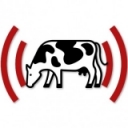
A new podcast series from CCE Dairy Educators and PRO-DAIRY titled "Dialing into Your Best Dairy" will be available soon! This 8 episode series will discuss management decisions across the different life stages of a dairy cow. The podcast will be available soon on the PRO-DAIRY website (https://prodairy.cals.cornell.edu/events/podcasts/) where you can find each episode along with additional resources and speaker contact information. For additional resources, reach out to Dairy Management Specialist, Alycia Drwencke.
Farm Safety Plans
Katelyn Walley, Business Management Specialist and Team Leader
Southwest New York Dairy, Livestock and Field Crops Program
One More Reminder, because it's REALLY IMPORTANT, Farm Safety Plan is REQUIRED
In order to protect the health and safety of your employees & farm, and from a legal risk management/liability perspective, be sure to complete your Farm Safety Plan ASAP. I know the sun is shining, the cows need to be milked, and sitting in front of a computer is the last thing you want to do right now - BUT this is a requirement regardless of your farm's size, employee numbers, production area, etc.
Black Cutworm and True Armyworm Moth Captures and Weed Pressure in SWNY
Joshua Putman, Field Crops and Forage Specialist
Southwest New York Dairy, Livestock and Field Crops Program

This week, Field Crops Specialist, Josh Putman, with the Southwest NY Dairy, Livestock, and Field Crops program scouted traps and fields throughout the region. In Avoca, NY, both moth species were present having 7 cutworm and 10 armyworm; not much larvae feeding was found. In Springville, NY 3 black cutworm and 3 armyworm were collected; we now have evidence of cutworm feeding on corn plants. According to Dr. Mike Stanyard of the NWNY Dairy, Livestock, and Field Crops team, it is important to be out scouting your fields now for pest damage and economic threshold that may require management. In addition, with the warm temperatures and increased day length, we are seeing an increase of weed pressure in our field crop production systems. Summer annual weeds compete for sunlight, nutrients and water. Don't let these pests rob your crop yields!
CFAP Applications Still Accepted - Call Your Local FSA Office Today!
Katelyn Walley, Business Management Specialist and Team Leader
Southwest New York Dairy, Livestock and Field Crops Program

The Coronavirus Food Assistance Program is still accepting applications from qualifying agricultural producers. Be sure to give you local office a call ASAP!
Allegany County: 585-268-5133 · Cattaraugus County: 716-699-2375 · Chautauqua County: 716-664-2351 · Erie County: 716-652-1400 · Steuben County: 607-776-7398
Navigating Farm Management Changes with Employees by Libby Eiholzer

Libby Eiholzer, Bilingual Dairy Specialist with the Northwest NY Dairy, Livestock and Field Crops team shares some key considerations for navigating farm management changes with your employees.
Cutworm and Armyworm Moth Captures Increase Significantly in Southwest NY
Joshua Putman, Field Crops and Forage Specialist
Southwest New York Dairy, Livestock and Field Crops Program

Field Crops Specialist, Josh Putman, with the Southwest NY Dairy, Livestock, and Field Crops program scouted traps and fields throughout the region. This week, moth captures increased significantly at both locations in the region. In Avoca, NY, both moth species were present having 13 cutworm and 11 armyworm. Higher numbers were captured in Springville, NY with 21 black cutworm and 13 armyworm collected; no evident feeding from larvae was present in corn fields that were emerged. Field Crops Specialists from the Northwest NY Program are finding much higher numbers of both pests in their traps this week. Correct identification of the larvae and larvae feeding can be difficult; contact your local extension specialist for proper identification and management.
Considerations for identifying and abating heat load in cattle
Alycia Drwencke, Dairy Management Specialist
Southwest New York Dairy, Livestock and Field Crops Program

While winter held out as long as it could, spring has arrived in a hurry and with it, much warmer temperatures. These increased temperatures are great for planting fields and harvesting forage, but are less ideal for our cattle. Some important considerations for identifying and abating heat load in cattle can help improve profitability within your herd. To learn more about heat abatement efficiency and utilizing cow-based indicators, reach out to our Dairy Management Specialist, Alycia Drwencke.
Dairy Market Watch - May 2020
Katelyn Walley, Business Management Specialist and Team Leader
Southwest New York Dairy, Livestock and Field Crops Program
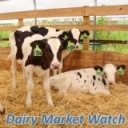
Dairy Market Watch is an educational newsletter to keep producers informed of changing market factors affecting the dairy industry. Dairy Market Watch is published on the last Tuesday of every month, funded in part by Cornell Pro-Dairy, and is compiled by Katelyn Walley-Stoll, Business Management Specialist with the Southwest New York Dairy, Livestock & Field Crops Program.
May 22nd 2020 NY Beef Industry Update
Amy Barkley, Team Leader & Livestock Specialist
Southwest New York Dairy, Livestock and Field Crops Program

More good news for beef producers: Processing capacity is now estimated to be around 70%, and is continuing to rise, albeit slowly. It's uncertain if the packing portion of the industry will exceed 90%, due to precautionary measures which have been instated at plants to protect workers. However, even with this and the backlog in animals ready for market, it's helping to raise the prices for NY beef. As of the May 22nd Livestock Report, feeder prices are up compared to last year, while finished steers and cull cows continue an upward trend as well.
COVID-19 Safety Plans Required for All Businesses in "New York Forward"
Katelyn Walley, Business Management Specialist and Team Leader
Southwest New York Dairy, Livestock and Field Crops Program
As NY begins to open up through phases, an important component of "New York Forward" requires all businesses to have a customized, written safety plan for preventing and managing COVID-19 on their facility. All food-producing farms are required to have a written plan in place and posted, but do not need to submit them to an agency for approval. It's not entirely clear how the New York Forward guidance will be enforced, but there is concern that the pandemic will cause an increase in lawsuits. Having a plan in place can be one way to reduce your farm's risk. The Cornell Ag Workforce Development program and CCE Specialists will be developing additional resources in developing safety plans over the next few days, but farms can start with New York Forward's Business Safety Template, which will meet this requirement. For any questions or concerns, reach out to Katelyn Walley-Stoll, Farm Business Management Specialist.
On-Farm Dairy Processing Webinar Recording
Alycia Drwencke, Dairy Management Specialist
Southwest New York Dairy, Livestock and Field Crops Program

This recording is from a free on-farm dairy processing webinar hosted on May 21st, 2020 by Cornell Cooperative Extensions Southwest NY Dairy, Livestock and Field Crops, and Harvest New York Programs with New York State's Department of Agriculture and Market's Division of Milk Control and Dairy Services. This is for dairy farmers who are interested in diversifying or vertically integrating their business. An introduction of factors to keep in mind when considering dairy processing for a farm's operation. This overview will focus on business considerations and a brief summary of regulatory requirements.
Spring 2020 SWNY Beef Industry Virtual Summit Meeting Highlights
Amy Barkley, Team Leader & Livestock Specialist
Southwest New York Dairy, Livestock and Field Crops Program

On May 5, 2020, SWNY beef farmers, CCE ag staff from local extension offices, and the SWNY Dairy, Livestock, and Field Crops Team gathered at a virtual summit to discuss beef production in the region. The region encompasses Allegany, Cattaraugus, Chautauqua, Erie, and Steuben counties. Discussion points were focused on factors surrounding changes to business as a result of the COVID-19 pandemic, in addition to what programming CCE can provide to regional farmers now and into the future. This white paper details major findings, insights, and educational programming ideas.
Monitoring Your Alfalfa Fields for Weevil
Joshua Putman, Field Crops and Forage Specialist
Southwest New York Dairy, Livestock and Field Crops Program
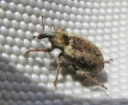
Despite this cold, wet spring, which has delayed planting and other farming efforts across NY, our pests and diseases continue to rear their ugly heads. This serves as a reminder that we need to continue to be vigilant with our scouting efforts for early detection of pests to make sound management decisions.
Creating Consumer-Friendly Bulk Meat Sales
Amy Barkley, Team Leader & Livestock Specialist
Southwest New York Dairy, Livestock and Field Crops Program

With uncertainty in meat markets for both producers and consumers alike, there has been a transition by some livestock producers to the direct marketing sector. For those already direct marketing, many have noticed a marked increase in the number of new customers for local meats. These opportunities do come with a set of rules and regulations to follow as well as tips to help make first-timers customers for life. Cornell Cooperative Extension has partnered with Ag Marketing Consultant, Matt LeRoux, to share "how to" tips on getting started with bulk meat sales. The recording of the original presentation, shared on May 4th and 13th, can be found on the Cornell Beef Blog at http://blogs.cornell.edu/beefcattle/producer-resources/creating-consumer-friendly-bulk-meat-sales/.
COVID-19: Farm Leadership Must Persevere to Victory
Katelyn Walley, Business Management Specialist and Team Leader
Southwest New York Dairy, Livestock and Field Crops Program

While some regions across the state are beginning their phased re-opening, we have to remember that we must continue to prioritize farm worker health and safety. Now is not the time to relax precautions. Rich Stup of Cornell's Agricultural Workforce Development program shares strategies for continuing to remain vigilant that includes assigning cleaning details, developing SOP's, and transparent (and socially distant) communication.
Soil Temperatures and Insect Captures Remain Low in Southwest New York
Joshua Putman, Field Crops and Forage Specialist
Southwest New York Dairy, Livestock and Field Crops Program

As daytime temperatures struggle to get above 50 F and nighttime temperatures falling below freezing, soils in Southwest NY are warming at a slow pace. Average soil temperatures across the SWNY region ranged from 42-56 F. Black cutworm and true armyworm moth counts also remain low as Avoca, NY had 0 black cutworm and 2 armyworm. Springville, NY location had 2 black cutworm and 3 armyworm moths in the traps. Weekly monitoring of these pests will continue and as temperatures continue to rise, we need to be scouting our fields for potential larvae. Contact Field Crop Specialist, Josh Putman, with the SWNY Dairy, Livestock, and Field Crops team for correct pest identification. For additional information, see the Crop Alert provided by the NWNY Diary, Livestock and Field Crops team.
A Glimmer Of Hope for Beef Producers
Amy Barkley, Team Leader & Livestock Specialist
Southwest New York Dairy, Livestock and Field Crops Program

On May 11, Derrell Peel with Oklahoma State University Extension provided a marketing update indicating that nationwide, beef plants are recovering capacity, albeit slowly. More locally, this is echoed by JBS Souderton's return to buying both cows and cattle, with plans to soon increase production. State auction prices are starting to come up across types of cattle, reflecting the increased demand.
Modern On Farm Preparedness Webinars
Alycia Drwencke, Dairy Management Specialist
Southwest New York Dairy, Livestock and Field Crops Program

The PRO-DAIRY team and Regional Dairy Specialists collaborated on hosting on farm preparedness programs. Several webinars from the programming, which too place in early 2020, are now available.
Caught! Black Cutworm and True Armyworm Moths Making Their Way into Southwest Ne
Joshua Putman, Field Crops and Forage Specialist
Southwest New York Dairy, Livestock and Field Crops Program

Black cutworm and True armyworm are problematic insects that can significantly cause damage here in New York. We are working to monitor these moths as they enter the region.
Cow Comfort Webinar Recordings
Alycia Drwencke, Dairy Management Specialist
Southwest New York Dairy, Livestock and Field Crops Program

During the winter of 2019, the PRO-DAIRY team and regional dairy specialists hosted several cow comfort workshops. Two portions of the workshops are now available as webinar recordings.
Robots show value in feed efficiency, reduced labor, by Tim Terry
Alycia Drwencke, Dairy Management Specialist
Southwest New York Dairy, Livestock and Field Crops Program

Timothy Terry, who has recently joined PRO-DAIRY staff as a Farm Strategic Planning Specialist, is publishing a series on Evaluating Robotics: Consistently feeding and milking in a robotic system can improve cow performance in American Agriculturalist. If you're thinking of switching to a robotic dairying system, think about the benefits in feed efficiency, cow management and labor, and whether those outweigh the costs of putting a system in.
Considerations for Slowing Feedlot Cattle Growth
Amy Barkley, Team Leader & Livestock Specialist
Southwest New York Dairy, Livestock and Field Crops Program

Considerations for Slowing Feedlot Cattle Growth, by Iowa State University and University of Wisconsin
Iowa State University Extension Beef Specialists, Iowa Beef Center University of Wisconsin Extension Livestock Program Educators, and University of Wisconsin Department of Animal Science Faculty have been evaluating the cattle markets, and what options producers have for their cattle at a time when beef prices are low and slaughter and processing capacities are down. Although not ideal, one choice may be to slow the rates of finishing cattle growth in an effort to wait for the market to turn around. This article details ways to do this for cattle at different stages, based on the goals of the operation. The overarching goal is to slow growth effectively without a heavy financial burden or causing negative effects on the finished carcass.
Paycheck Protection Program & Economic Injury Disaster Loan
Katelyn Walley, Business Management Specialist and Team Leader
Southwest New York Dairy, Livestock and Field Crops Program
Elizabeth Higgins (ENY Commercial Horticulture Program),Nicole Tommell (CNY Dairy, Livestock, and Field Crops Program), & Myron Thurston (CCE-Madison) share more information about federal programs now available to farmers.
Cornell Pesticide Management Education Program
Joshua Putman, Field Crops and Forage Specialist
Southwest New York Dairy, Livestock and Field Crops Program
Along with the increased use of disinfectants and sanitizers during the COVID-19 pandemic,
there has been an increase in adverse health effects from the misuse of these
products. There have also been several fraudulent products produced during this
time that potential applicators should be made aware of.
Dairy Market Watch - April 2020
Katelyn Walley, Business Management Specialist and Team Leader
Southwest New York Dairy, Livestock and Field Crops Program
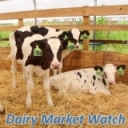
Dairy Market Watch is an educational newsletter to keep producers informed of changing market factors affecting the dairy industry. Dairy Market Watch is published on the last Tuesday of every month, funded in part by Cornell Pro-Dairy, and is compiled by Katelyn Walley-Stoll, Business Management Specialist with the Southwest New York Dairy, Livestock & Field Crops Program.
Beef Market Update, April 16th, 2020
Amy Barkley, Team Leader & Livestock Specialist
Southwest New York Dairy, Livestock and Field Crops Program

On April 16, 2016, Dr. Mike Baker, Betsy Hodge, and Bill Bullock shared a marketing update for the beef industry. At this time, the industry is reporting revenue losses and decreased capacity for processing in response to decreased demand and the implementation of measures which safeguard employee health. For those who have cattle which are ready for market, recommendations for different classes of cattle were discussed.
For the latest NYS beef cattle market information, visit the Cornell Beef Management website: https://blogs.cornell.edu/beefcattle/market-information/.
Creating a Dairy Farm Operating Plan
Alycia Drwencke, Dairy Management Specialist
Southwest New York Dairy, Livestock and Field Crops Program

Paul Mitchell, ASHLEY A OLSON, Carl Duley, RYAN A STERRY and JEROME R CLARK at the University of Wisconsin-Madison have put together an example template to create a dairy farm operating plan in these uncertain times.
USCIS Gives H-2A Workers Temporary Flexibility to Stay and Work Longer
Alycia Drwencke, Dairy Management Specialist
Southwest New York Dairy, Livestock and Field Crops Program

Cornell Agricultural Workforce Development has shared some of the key excerpts on H-2A updates. Notice was published in the Federal register on Monday that gives H-2A workers temporary flexibility to stay and work longer in the United States.
Diet and Management Considerations for Emergencies: Reducing Milk Flow
Alycia Drwencke, Dairy Management Specialist
Southwest New York Dairy, Livestock and Field Crops Program

Mike Van Amburgh, Tom Overton, and Julio Giordano, Department of Animal Science faculty at Cornell University have put together an article on Diet and Management Considerations for Emergencies: Reducing Milk Flow Without Harming Cows and Threatening Future Production. With cooperatives encourage reduced milk production, these are important aspects to consider.
Financial Considerations - Are You Milking Some Cows You Shouldn't Be?

Joan Sinclair Petzen, John Hanchar, both NWNY Dairy, Livestock, and Field Crops Team, and Andrew Novakovic, Cornell University, have put together some financial considerations for the number of cows you are milking and managing during these challenging times.
Face Covering Required for Essential Workers With Direct Public Contact
Katelyn Walley, Business Management Specialist and Team Leader
Southwest New York Dairy, Livestock and Field Crops Program

"For all essential businesses or entities, any employees who are present in the workplace shall be provided and shall wear face coverings when in direct contact with customers or members of the public. Businesses must provide, at their expense, such face coverings for their employees. This provision may be enforced by local governments or local law enforcement as if it were an order pursuant to section 12 or 12-b of the Public Health Law. This requirement shall be effective Wednesday, April 15 at 8 p.m."
Stressed out? Think like a SEAL
Katelyn Walley, Business Management Specialist and Team Leader
Southwest New York Dairy, Livestock and Field Crops Program
Everyone knows that the U.S. Navy SEALS are an elite fighting force, and recognized the world over for their exploits. The training they undergo is rigorous and demanding. Given recent events, Tim Terry of Harvest NY has shared a little psychological boost. So here are the Big Four so you, too, can think like a SEAL.
What's With All of the Milk Dumping?
Katelyn Walley, Business Management Specialist and Team Leader
Southwest New York Dairy, Livestock and Field Crops Program

The Southwest New York Dairy, Livestock, and Field Crops Program would like to reassure the region's consumers that there is no reason for concern regarding the safety of our food system or threats of food shortages. This has been supported by the Institute for Food Safety at Cornell University. Farms nationwide, including dairies, have been deemed essential businesses and are still working daily to produce safe, wholesome foods that families can enjoy - even during this uncertain time. By Katelyn Walley-Stoll and Alycia Drwencke.
Fertilizer Value of Milk and Feeding Milk
Alycia Drwencke, Dairy Management Specialist
Southwest New York Dairy, Livestock and Field Crops Program

With many farms being faced with the unfortunate situation of dumping their milk, some farms are considering the value of this milk for fertilizer and as feed for calves and cows. Karl Czymmek, Cornell PRO-DAIRY Specialist discusses the nutrient value of milk as fertilizer, while Maggie Gilles, Associate Editor for Hoard's Dairyman, shares resources on feeding milk to the herd.
How warm are your soils? Things to consider prior to planting
Joshua Putman, Field Crops and Forage Specialist
Southwest New York Dairy, Livestock and Field Crops Program
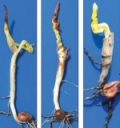
Selection of optimal planting date is one of the most critical factors in the decision making process for producers. When making this decision, producers should consider soil temperatures rather than just calendar dates. How warm are your soils?
Management Strategies During COVID-19 from PRO-DAIRY
Alycia Drwencke, Dairy Management Specialist
Southwest New York Dairy, Livestock and Field Crops Program

Several resources have been put together by the Cornell PRO-DAIRY team and Cornell CALS Faculty to cover management and financial considerations for dairy farms during COVID-19.
New COVID-19 Resources and Guidance for Farm Workers
Alycia Drwencke, Dairy Management Specialist
Southwest New York Dairy, Livestock and Field Crops Program

A video in Spanish is available to discuss COVID-19 with your employees. Additionally, the Centers for Disease Control and Prevention have issued new guidance for employees exposed to COVID-19. These and other resources have been compiled by Cornell Agricultural Workforce Development.
NYS DEC delays enforcement of the pesticide certification period
Joshua Putman, Field Crops and Forage Specialist
Southwest New York Dairy, Livestock and Field Crops Program

Pesticide Certification and Business Registration during Pause-NY: DEC is taking the following actions to temporarily allow regulatory flexibility and continued pesticide application and business operations during Pause-NY due to the unique conditions facing New York and the entire nation.
Reliable Resources for Spanish- & English-Speaking Farmworkers about COVID-19

Libby Eiholzer, CCE Northwest NY Dairy, Livestock & Field Crops Team, and Richard Stup, Cornell Agricultural Workforce Development have compiled reliable resources for farm workers on COVID-19 in both English and Spanish.
From our Team to Yours: COVID-19 Resources for Dairy Farmers
Alycia Drwencke, Dairy Management Specialist
Southwest New York Dairy, Livestock and Field Crops Program

The South Central NY Dairy and Field Crops Team has compiled a list of articles that we think may be useful to dairy producers and their service providers as we all navigate the COVID-19 situation. Please stay safe and reach out to our team if you have questions or need help finding information. We are here to help with tools and resources to support all of the normal day-to-day dairy, livestock, and field crop management considerations, in addition to emerging topics related to COVID-19. For additional resources or information, please reach out to Alycia Drwencke, Dairy Management Specialist, or Katelyn Walley-Stoll, Farm Business Management Specialist.
Scout your hay fields to assess winter annual weed pressure
Joshua Putman, Field Crops and Forage Specialist
Southwest New York Dairy, Livestock and Field Crops Program

Alfalfa and grass hay stands are greening up across Southwest NY and all across Western NY over the last 10 days. Recently, Field Crops Specialist Josh Putman with the SWNY Dairy, Livestock, and Field Crops Team, has been out monitoring fields for potentially damaging pests in hay production fields. Winter annual weeds are being seen in high numbers and even more so in older hay stands.
Vendor Finance in the Northeast Dairy Industry
Katelyn Walley, Business Management Specialist and Team Leader
Southwest New York Dairy, Livestock and Field Crops Program

Originally published in farmdocDAILY by Chad Fiechter and Jennifer Ifft. Many dairy farms report difficult accessing credit when milk prices are low and use of accounts payable with feed mills as management strategy for low margin periods. Through cooperation with NEAFA, we conducted a survey of feed manufacturers, ultimately collecting details of 5 years of accounts receivable data from firms that represent over 70% of the industry by volume. We found that average delinquencies (share of accounts receivable that are overdue) held by NE feed manufacturers have more than doubled since 2014 to over 10%. The magnitude of this "effective credit" is similar to a large regional community bank. This corresponds with a long period of negative profit margins for many dairy farms. We confirm this countercyclical relationship with Cornell Dairy Farm Business Summary data from 1993. We found that dairy farms have a large increase in accounts payable when profit margins are low, especially during the recent/ongoing downturn. Use of accounts payable as "effective credit" is much more common among highly leveraged farms, suggesting higher than average risk for feed manufacturers.
Dairy Farm Risk Management Options April 2020
Katelyn Walley, Business Management Specialist and Team Leader
Southwest New York Dairy, Livestock and Field Crops Program
Christopher Wolf, Cornell University, shares risk management options for dairy farms to consider to reduce the impact of milk price decreases.
Do's and Don'ts for Dairy Farmers When Facing Financial Difficulty
Katelyn Walley, Business Management Specialist and Team Leader
Southwest New York Dairy, Livestock and Field Crops Program

A quick outline for dairy farmers to use in times of financial uncertainty, prepared by Wayne Knoblauch, Cornell University, and Jason Karszes, PRO-DAIRY.
CARES Act's Emergency Resources for Farms: Paycheck Protection Loan Program
Katelyn Walley, Business Management Specialist and Team Leader
Southwest New York Dairy, Livestock and Field Crops Program
Financial Assistance for Farms Facing the COVID-19 Crisis
Katelyn Walley, Business Management Specialist and Team Leader
Southwest New York Dairy, Livestock and Field Crops Program

Farm businesses and operations have been deemed essential and will continue to remain in operation producing high-quality, safe food products for consumers all across the world. However, with market disruptions, employees' family obligations, and potentially catastrophic commodity prices, farm profitability uncertainties are an added source of concern.
Note from ADA North East Regarding Milk Sale Limits at Retail Locations
Katelyn Walley, Business Management Specialist and Team Leader
Southwest New York Dairy, Livestock and Field Crops Program

Are you still seeing grocery stores limiting dairy purchases? Let the American Dairy Association North East know!
The State of Dairy Markets
Katelyn Walley, Business Management Specialist and Team Leader
Southwest New York Dairy, Livestock and Field Crops Program

A message from Katelyn Walley-Stoll, Farm Business Management Specialist with Cornell University Cooperative Extension's Southwest New York Dairy, Livestock, and Field Crops Program:
A lot of people have been asking me about all of the photos and videos going around of milk being dumped. This is a long, but explanatory article from two industry experts, with some tips and things for farms to think about in these uncertain times. At the end of the day, remember that our food supply is safe, you will still be able to buy milk, and farmers keep farming. Keep our farmer's in your thoughts and buy a couple extra blocks of American Made cheese or tubs of ice cream. Don't forget, I put together a monthly report called Dairy Market Watch that is an educational newsletter to keep producers informed of changing market factors affecting the dairy industry. To subscribe, click here and enter your contact information. Stay safe - Katelyn.
Considerations for Dumping Milk
Alycia Drwencke, Dairy Management Specialist
Southwest New York Dairy, Livestock and Field Crops Program

With reports of milk being dumped from some farms across the state and nation, there are a few considerations to keep in mind should your farm or cooperative unfortunately end up in this situation.
Dairy Responding to COVID-19 Podcast by PRO-DAIRY
Alycia Drwencke, Dairy Management Specialist
Southwest New York Dairy, Livestock and Field Crops Program

Rob Lynch and Kathy Barrett with Cornell PRO-DAIRY, interview industry representatives and producers, on the topic of Dairy Responding to COVID-19 in a limited series podcast.
Don't send cows to market that are not fit to transport, Dr. Mike Baker
Alycia Drwencke, Dairy Management Specialist
Southwest New York Dairy, Livestock and Field Crops Program

Dr. Mike Baker, Cornell Beef Extension Specialist, reminds us to check for fitness of transport prior to sending cattle to market in his blog. Included are links to useful resources for determining fitness for transport, such as a checklist developed by Dr. Baker and Rob Lynch, DVM, PRO-DAIRY.
Impact of Beef Processing Plant Closures
Amy Barkley, Team Leader & Livestock Specialist
Southwest New York Dairy, Livestock and Field Crops Program
Impact of Beef Processing Plant Closures, written by Dr. Mike Baker
In response to the COVID-19 pandemic, large processing plants servicing NY beef producers have made changes to allocations of which and how many beef animals are harvested to meet current consumer demand. As of Monday, March 30th, positive tests among plant workers have resulted in a temporary closure of one of the region's most prominent processing plants, JBS, in Souderton, PA. In response, Dr. Mike Baker of Cornell University wrote this article, which explores what this means for farmers, while giving recommendations of best management practices to get producers through this transition period. Read the full article here.
Biosecurity for People: 7 Steps to Protect Farm Workers from COVID-19

Mary Kate Wheeler, Farm Business Management Specialist with the South Central NY Dairy & Field Crops Team, shares 7 tips for protecting your farm employees from COVID-19 in her latest blog post.
Achieving a better price for you beef or dairy feeder cattle, Dr. Michael Baker

Recently, Dr. Michael Baker, Cornell University Beef Extension Specialist, shared some ideas on how you can add value to your calves. The full report can be found here.
COVID-19 and Your Dairy Webinar
Alycia Drwencke, Dairy Management Specialist
Southwest New York Dairy, Livestock and Field Crops Program

Richard Stup, PhD, Cornell Agricultural Workforce Development, and Rob Lynch, DVM, Cornell CALS PRO-DAIRY hosted a webinar recently discussing COVID-19 and Your Dairy, which is now available online with additional resources.
Dairy Market Watch - March 2020
Katelyn Walley, Business Management Specialist and Team Leader
Southwest New York Dairy, Livestock and Field Crops Program
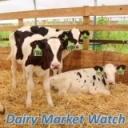
Dairy Market Watch is an educational newsletter to keep producers informed of changing market factors affecting the dairy industry. Dairy Market Watch is published on the last Tuesday of every month, funded in part by Cornell Pro-Dairy, and is compiled by Katelyn Walley-Stoll, Business Management Specialist with the Southwest New York Dairy, Livestock & Field Crops Program.
Video describing COVID-19 in Spanish

The Cornell Farm Worker Program has put together a video describing COVID-19 in Spanish.
NY FarmNet Continues to Offer Free Services - Call 1-800-547-3276
Katelyn Walley, Business Management Specialist and Team Leader
Southwest New York Dairy, Livestock and Field Crops Program
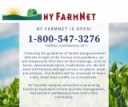
NY FarmNet is continuing to support our agricultural producers through free and confidential consultations.
Note from Cornell Small Farms in the Face of Crisis
Katelyn Walley, Business Management Specialist and Team Leader
Southwest New York Dairy, Livestock and Field Crops Program
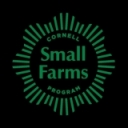
Anu Rangarajan from the Cornell Small Farms Program shares information and helpful suggestions for farms in the face of our current situation.
Novel Coronavirus Prevention & Control for Farms
Katelyn Walley, Business Management Specialist and Team Leader
Southwest New York Dairy, Livestock and Field Crops Program

Richard Stup of Cornell Cooperative Extension's Agricultural Workforce Development program shares tips for farm employers in light of the COVID-19 crisis. Originally published here.
Meeting the Continuing Education Requirements of FARM Program Version 4.0

Lindsay Ferlito, Dairy Management Specialist with the North Country Regional Ag Team discusses how you can fulfill the continuing education aspect of FARM Version 4.0. As of January 1, 2020, all non-family and family employees with animal care responsibilities must be provided with continuing education opportunities.
National Dairy FARM Program Version 4.0 Updates by Lindsay Ferlito
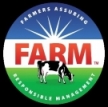
Lindsay Ferlito, Dairy Management Specialist with the North Country Regional Ag Team shares updates on the National Dairy FARM Program Version 4.0. This version of the FARM program went into effect on January 1, 2020.
Resources to Help Train Your Dairy Employees with Animal Care Responsibilities

Betsy Hicks, Area Dairy Specialist with the South Central New York Dairy & Field Crops Team shares useful resources to aid in training employees with animal care responsibilities. These resources can be used to fulfill the continuing education aspect of FARM 4.0.
Dairy Market Watch - February 2020
Katelyn Walley, Business Management Specialist and Team Leader
Southwest New York Dairy, Livestock and Field Crops Program
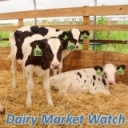
February 2020 edition of Dairy Market Watch, an educational newsletter to keep producers informed of changing market factors affecting the dairy industry.
You Don't Say...By Timothy X. Terry, Harvest NY

Learn more about hiring a contractor for your farm project from Timothy X. Terry of Cornell Cooperative Extension's Harvest NY program.
Tips on Recruiting and Retaining Quality Employees on your Dairy Farm
Alycia Drwencke, Dairy Management Specialist
Southwest New York Dairy, Livestock and Field Crops Program

Libby Eiholzer of the Northwest New York Dairy, Livestock & Field Crops Program shares information on retaining employees with DairyBusiness.
Dairy Market Watch - January 2020
Katelyn Walley, Business Management Specialist and Team Leader
Southwest New York Dairy, Livestock and Field Crops Program
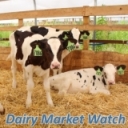
January 2020 edition of Dairy Market Watch, an educational newsletter to keep producers informed of changing market factors affecting the dairy industry.
An Update from SWNYDLFC
Katelyn Walley, Business Management Specialist and Team Leader
Southwest New York Dairy, Livestock and Field Crops Program

Since July 1st, 2019, our new program has been busy with on-boarding, needs assessment, educational programming, and getting the chance to meet some of our region's amazing farmers. We've hired four specialists that are on-board and ready to hit the ground running in the specialty areas of Farm Business Management, Field Crops, Dairy Management, and Livestock. We're working with each of our five county associations' Executive Directors, Board of Directors, Program Committees, and Agriculture Program Staff to get to know the region and its programming needs while introducing this collaborative model of dairy, livestock, and field crops outreach.
Dairy Market Watch - December 2019
Katelyn Walley, Business Management Specialist and Team Leader
Southwest New York Dairy, Livestock and Field Crops Program
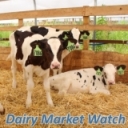
December 2019 edition of Dairy Market Watch, an educational newsletter to keep producers informed of changing market factors affecting the dairy industry.
Dairy Market Watch - November 2019
Katelyn Walley, Business Management Specialist and Team Leader
Southwest New York Dairy, Livestock and Field Crops Program
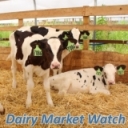
November 2019 edition of Dairy Market Watch, an educational newsletter to keep producers informed of changing market factors affecting the dairy industry.
Dairy Market Watch - October 2019
Katelyn Walley, Business Management Specialist and Team Leader
Southwest New York Dairy, Livestock and Field Crops Program
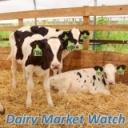
October 2019 edition of Dairy Market Watch, an educational newsletter to keep producers informed of changing market factors affecting the dairy industry.
Dairy Market Watch - September 2019
Katelyn Walley, Business Management Specialist and Team Leader
Southwest New York Dairy, Livestock and Field Crops Program
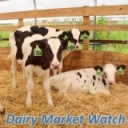
September 2019 edition of Dairy Market Watch, an educational newsletter to keep producers informed of changing market factors affecting the dairy industry.
Dairy Market Watch - August 2019
Katelyn Walley, Business Management Specialist and Team Leader
Southwest New York Dairy, Livestock and Field Crops Program
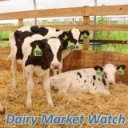
Dairy Market Watch is an educational newsletter to keep producers informed of changing market factors affecting the dairy industry.
Beef Farm Account Book Available!
Katelyn Walley, Business Management Specialist and Team Leader
Southwest New York Dairy, Livestock and Field Crops Program

The Cornell Beef Farm Account Book is once again available. This accounting record book is designed specifically for beef producers. A complete and accurate set of financial records helps producers develop accurate tax returns but as important gives them the data to analyze their business.
Confidently Hosting a Farm Tour - Part One - What's Your "Why Bother" ?
Katelyn Walley, Business Management Specialist and Team Leader
Southwest New York Dairy, Livestock and Field Crops Program

We've been approached by many agricultural producers who are interested in hosting a farm tour, but are unsure of where to start. Our hope is that this article series will help our agricultural community share the stories of their farms, and feel confident while doing so.
Sexual Harassment Training Resource Available
Katelyn Walley, Business Management Specialist and Team Leader
Southwest New York Dairy, Livestock and Field Crops Program
Dairy Market Watch - June 2019
Katelyn Walley, Business Management Specialist and Team Leader
Southwest New York Dairy, Livestock and Field Crops Program
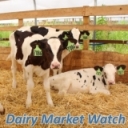
Nicole Tommell, Area Ag Business Management Specialist/Team Leader
Central New York Dairy and Field Crops
Now that tax season is coming to a close, machinery is prepped and ready for impending field work, I would like to challenge farm owners to review any human resource items that may have been overlooked after January 1st. Although it seems redundant, a short review of all necessary trainings and employee files will be beneficial for the employee and the employer.
When Planting Goes Wrong...
Kevin Ganoe, Area Field Crop Specialist
Central New York Dairy and Field Crops
Economics of Producing Industrial Hemp, Costs of Production, NYS, 2017
John Hanchar, Farm Business Management Specialist
Northwest New York Dairy, Livestock & Field Crops
Costs of Production Analysis, Industrial Hemp, NYS, 2017
- Variable costs of production estimates for 2017 are $282, $268, and $269 per acre for industrial hemp for fiber only, fiber and seed, and seed only, respectively
- Fixed costs of production estimates for 2017 are $145, $183, and $160 per acre for industrial hemp for fiber only, fiber and seed, and seed only, respectively
- Total costs of production estimates for 2017 are $427, $451, and $429 per acre for industrial hemp for fiber only, fiber and seed, and seed only, respectively
Upcoming Events
Boots in the Barn: Cornell Dairy Research Updates
January 13, 2026
January 20, 2026
January 27, 2026
February 3, 2026
February 10, 2026
February 17, 2026
February 24, 2026
Advanced Hoof Health Program
January 15, 2026
Belfast, NY
NY Pork Producers Connection Breakfast - Geneseo
January 17, 2026 : Pork Producers Connection Breakfast - Geneseo
Geneseo, NY
Announcements
No announcements at this time.





